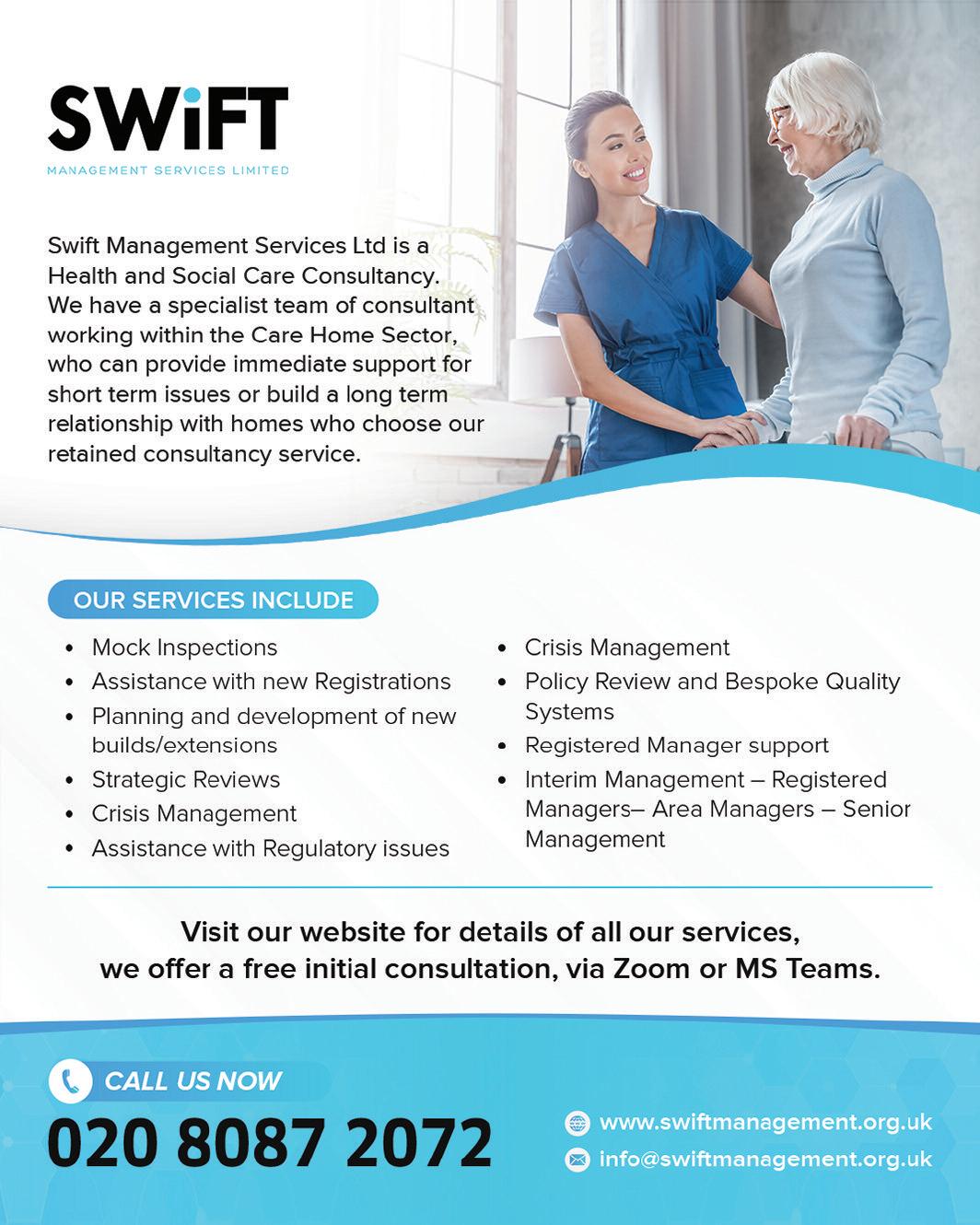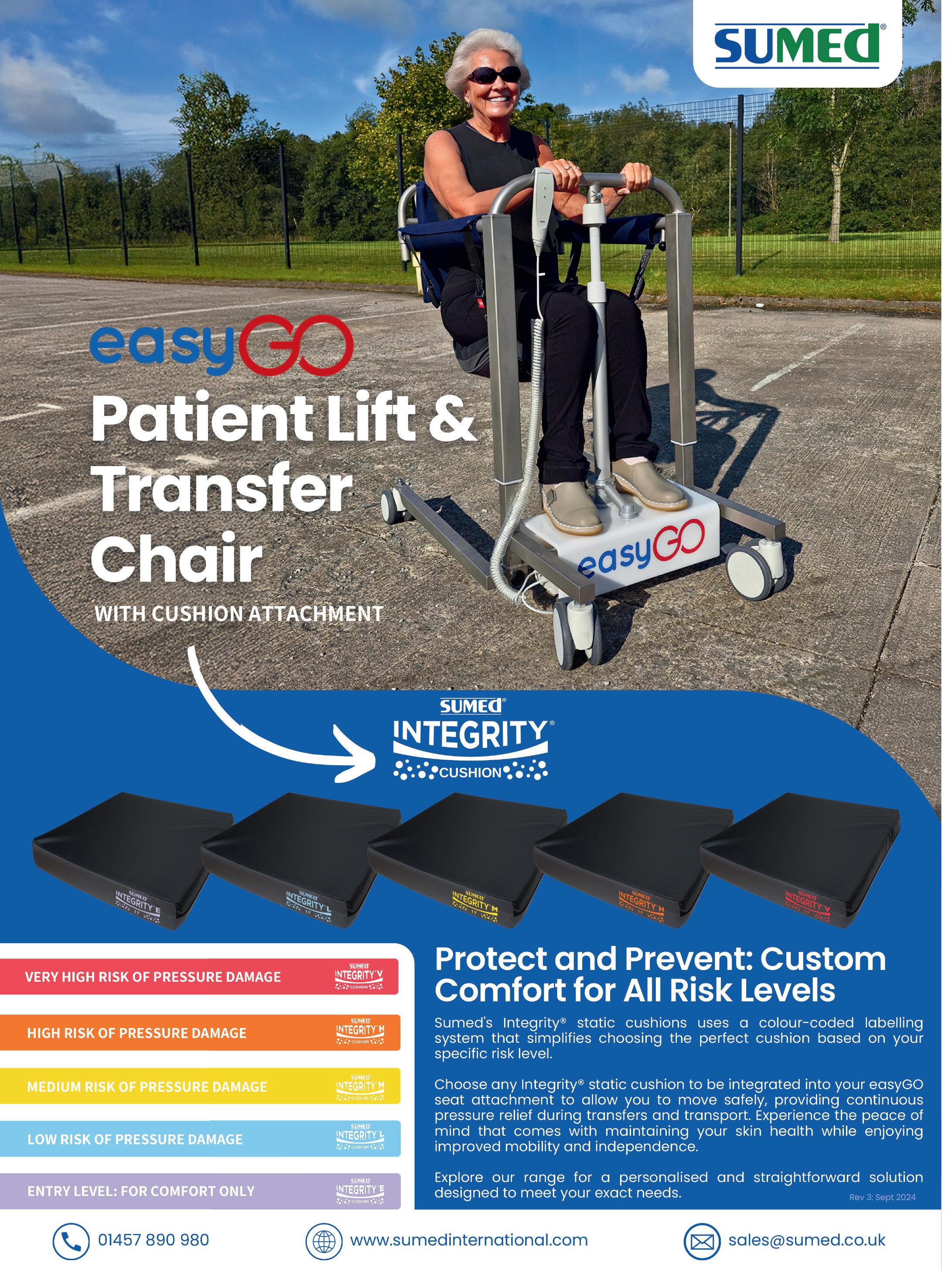















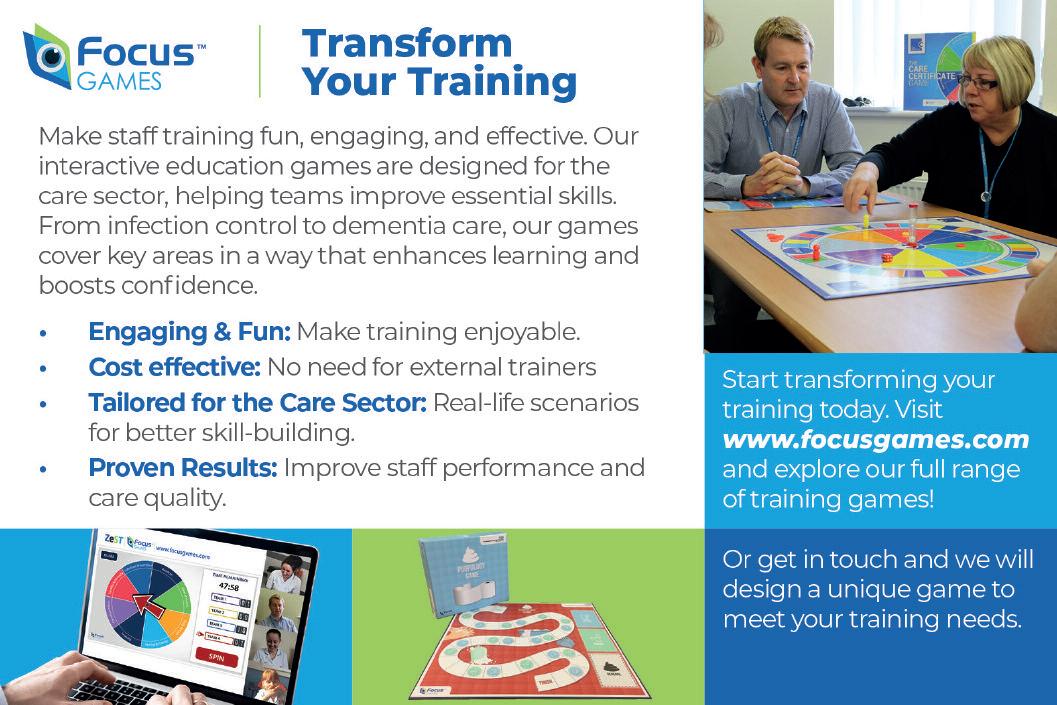


Editor Peter Adams
A bit of a short comment today, since we at The Carer are exhibiting at The Care Show today (Wednesday) and tomorrow (Thursday) at the NEC, Birmingham!
You'll find us at Stand H05 conveniently located near the show's entrance I, Peter Adams, Editor of The Carer, will be attending both days, joined by our Sales Director David (Dave) Bartlett We warmly invite you to stop by and say hello
The Care Show has a well-established reputation for bringing together individuals teams and organisations with a shared mission: improving the quality of care across the UK
Over the two days, you'll have the opportunity to attend educational sessions and seminars led by industry experts who will share best practices and innovations shaping the care sector

We look forward to listening to your thoughts learning from your experiences, and discussing the latest news and views in the care community The event is a fantastic opportunity to collaborate network and explore innovations that are transforming the care sector
See you at Stand H05 –
we can t wait to meet you!
This issue of The Carer Digital is packed with a wealth of informative articles and expert insights and practical advice from seasoned professionals for the social care sector
And once again I have to thank you for the many positive stories from care homes and providers across the country - it's always wonderful to receive so many articles about the activities and events involving your residents Please do keep sending them in and we are always delighted to feature them!
I can always be contacted at editor@thecareruk com and encourage our readers to sign up for our bi-weekly digital newsletter at www thecareruk com and follow us on social media for all the latest news
THE CARER, we are calling on our readers for help
As you may have seen in our appeal for support The CARER has always been delivered in print and online free of charge since 2004 including the sector's only weekly digital issue
We are committed to keeping you informed with the latest news, views, products, and services on the sector s most popular adult social care website www thecareruk com , which receives almost 4,000 visits and 26,000 page reads every day

However, with costs rising significantly, we recently put out an appeal for support
We extend our heartfelt thanks to readers who have responded and pledged their support with a £10 donation covering the next two years, and thank you also for your very kind words of support too!
Your contributions are invaluable and if you haven't yet pledged please do consider supporting us so we can continue delivering quality content
For details on how to contribute please visit www thecareruk com/subscriptions/


The warning comes in the CCN’s Budget and Spending Review submission to the government published alongside a major new report
The Financial Outlook for Councils this Parliament
This report features new spending need analysis by PwC and funding projections from Pixel Financial Management, both commissioned by the CCN
While the analysis shows that yearly rises in council tax of 3% could reduce this cumulative deficit to £38bn over the next five years the CCN argues that the government ‘cannot rely on rises higher than 3% to help plug the gap and local authorities would still be left to find billions each year in ‘undeliverable service reductions
LEGAL RESPONSIBILITY
Despite yearly council tax rises over the past decade local authorities have had to prioritise funding to high demand services where they have a legal responsibility such as special educational needs children’s services and adult social care
This has meant they have had to reduce their spend on other vital every day services such as libraries, buses, road maintenance, children s centres and youth services
These important functions are some of the 800 different local services provided to local residents and businesses by councils Many of these are also statutory services which councils are legally obliged to deliver while others are discretionary
But under current projections even with yearly council tax increases councils warn they will have no choice but to continue to divert even more funding to care services This will leave them providing ‘little more’ than care services in just a matter of years
However with many councils already providing close to statutory minimum levels in services this will still not be enough – threatening their ability to remain solvent unless their statutory obligations change
With county and rural unitary authorities facing the largest deficits in local government over the next five years a new survey of chief executives of these authorities reveals that 16 could be at risk of declaring bankruptcy by 2026/27 with a further six the year after if government does not provide extra funding and councils statutory responsibilities remain the same This could impact services delivered to over 16 million residents in England
The CCN s analysis reveals:
As a result of rising demand, inflation and continuing market failure, councils are forecast to see a rise of £26bn between 2022 and 2030 in additional costs, which are primarily driven in the three key service areas: adult social care children s social care and home to school transport Adult social care spending in England is predicted to increase by £11 8bn children s services by £8 4bn and home to school
transport by £1 7bn
• Due to these additional costs and if there is no extra funding for councils from the government then councils face a cumulative funding gap of £54bn over the next five years County and rural unitary authorities in England represent 36% £20 3bn of this cumulative total
• Raising council tax annually by 3% would reduce the shortfall by a third to £37 6bn but the CCN says that government should not rely on rises above 3% to close the remaining shortfall
Councils say deep and fundamental reform to services this parliament could help reduce the funding shortfall further Analysis contained in the report shows that if reforms are implemented and they help contain demand and costs spending could be curtailed over time This could limit the forecast growth in children s services adult social care and home to school transport expenditure from 2027 reducing the cumulative deficit further to £24 2bn over the five-year forecast including council tax rises each year
However the CCN warns that this reduction won t occur unless the government introduce and drive through reforms to address spiralling costs in children s services adult social care and in special educational needs
Cllr Barry Lewis Finance Spokesperson and Vice-Chair of the County Councils Network, said: “Councils pride themselves on the quality and breadth of the care services that they provide to vulnerable people However, councils do much more than this: delivering over 800 different services to local residents and businesses many of which are essential to people’s everyday lives ”
But today s new analysis shows the bleak financial outlook facing local authorities of all shapes and sizes To meet all their projected service pressures councils are starring down the barrel of a £54bn funding black hole While council tax rises can reduce this deficit, government cannot rely on this alone and local authorities would still be left to find billions each year ”
With the funding gap fuelled by rising costs in adult social care children’s services and SEND transport, councils will have to divert even more funding to prop up these services leaving councils providing little more than care services by the end of this Parliament But with many local authorities already close to the legal minimum on the services they deliver, our survey shows still won’t be enough for some Ministers would therefore have no choice but to radically rethink the statutory responsibilities placed upon councils to prevent six in ten declaring bankruptcy by 2028
“However this unpalatable trade-off can be avoided by providing a substantive injection of resources to help shore up services this parliament, then embarking on deep and fundamental reform to address demand and market failures driving costs in children s services special
educational needs and adult social care This needs to happen urgently with a plan to be actioned within the next 18 months otherwise we risk undermining the wide-ranging purpose of local government and derailing the government’s mission-led approach to public-service reform and greater devolution to councils
FIX FOUNDATIONS
A Government spokesperson said: “We will help support people to live an independent, dignified life and give every child the best life chances possible
Despite the inheritance left we will work with local government to fix the foundations and get them back on their feet by doing the basics right including providing more stability through multi-year funding settlements ending competitive bidding for pots of money and reforming the local audit system
“We will set out more detail at the next spending review and local government finance settlement but stand ready to speak to any council that is experiencing financial difficulties
A key driver of rising costs for adult social care is the increasing number of working age adults with disabilities living longer with more complex needs and a larger number of people with mental health needs who require support
Last month the Local Government Association (LGA) warned in its submission to the Treasury ahead of the budget that the Government needs to take immediate steps to stabilise council finances and protect vital local services
The LGA said there is a growing risk of systemic financial failure with 18 councils reliant on being given Exceptional Financial Support by the Government in February to balance their books in 2024/25
LGA analysis shows that due to inflation and wage pressures alongside cost and demand pressures English councils face a £2 3 billion funding gap in 2025/26 rising to £3 9 billion in 2026/27 This is a £6 2 billion shortfall across the two years
Councils they said are increasingly having to draw on their financial reserves to manage these cost pressures and balance their budgets Councils’ un-ringfenced reserves fell by £1 7 billion in 2022/23 and £1 1 billion in 2023/24 Some 42 per cent of councils drew on their reserves in both years The LGA is clear that the use of reserves is not a sustainable solution to current budget pressures – reserves can only be spent once
While the Government has warned that the Autumn Budget will be painful with departments being tasked with finding savings the LGA said any further local government funding cuts would tip many more councils towards financial ruin and leave them unable to deliver key local services
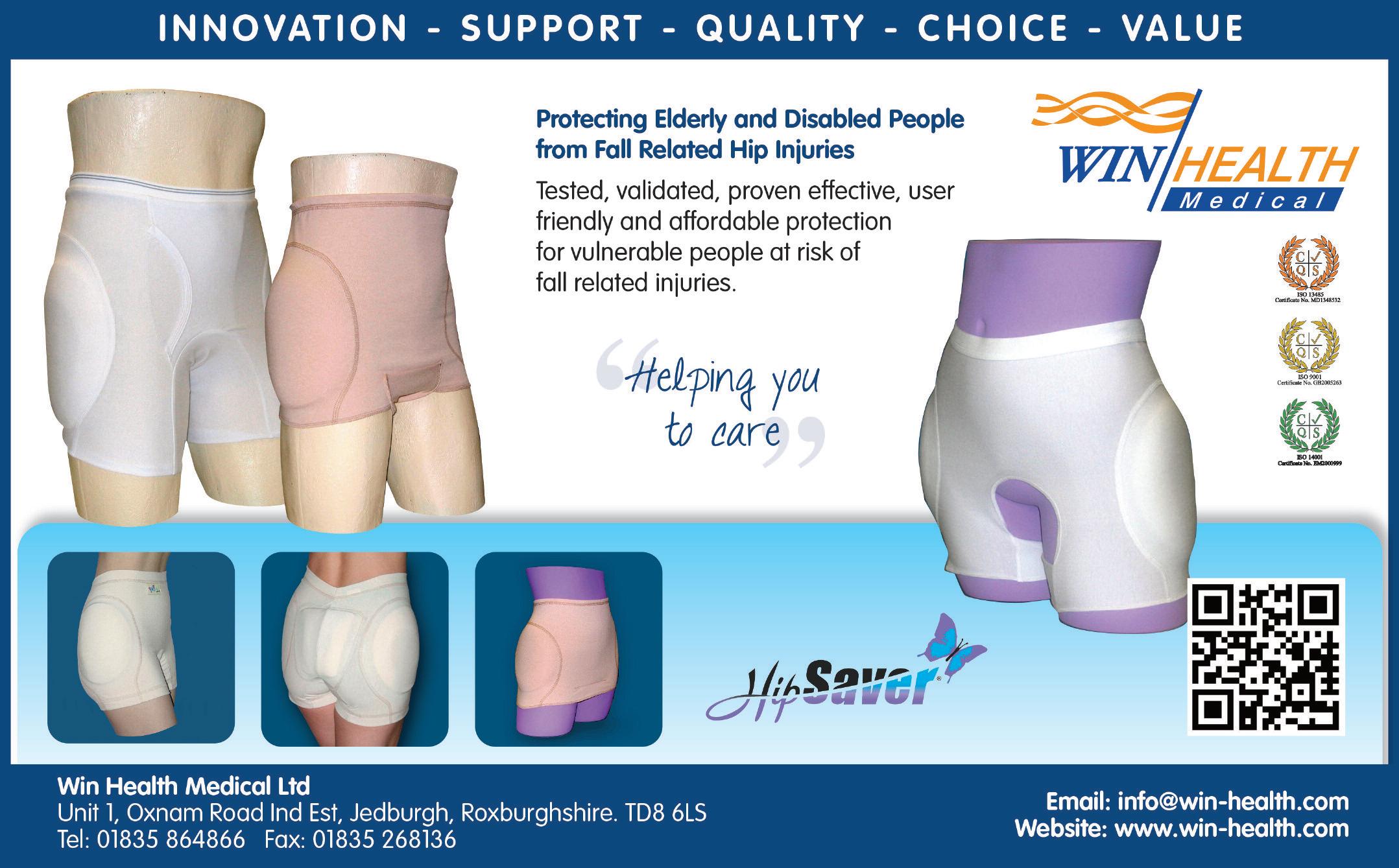

Paul Ball, employment partner at Gateley Legal (https://gateleyplc com/gateley-legal/), takes a look at the key areas that employers in the care sector need to be aware of when it comes to employment law
PRE-EMPLOYMENT
An employer’s responsibility to adhere to employment law begins before they even meet a candidate including the right to work ensuring that candidates are UK residents, or have the relevant visas to work in the UK Migrant workers make up a significant proportion of those employed in the care sector, so it’s important to ensure that they have visas in place to legally work here If these checks are not done and employers are found to be employing illegal workers sanctions include unlimited fines and criminal charges
CONTRACTS
Employment contracts need to be in place from day one of employment for all employees Not only is this a legal requirement but it governs the working relationship and avoids the possibility of disagreements arising such as pay or working patterns
The care sector makes use of many different employment types including full or part-time employees agency staff and temporary employees Employers need to be aware of the different rights associated with each type of engagement and tailor the contracts accordingly
All contracts should comply with section 1 of the Employment Rights Act 1996 which requires details such as hours of work, paid leave, training and benefits
HEALTH AND SAFETY
Under the Health and Safety at Work Act 1974, employers are responsible for the safety of their employees In the care sector important areas to consider when it comes to health and safety are:
Shift length and rest breaks - employees are entitled to:
One 20-minute break per period of working time where that period is at least six hours
A daily rest period of not less than 11 consecutive hours in each 24-hour period and a weekly rest period of not less than 24 hours uninterrupted rest in a 7-day period which can be either two uninterrupted periods of not less than 24 hours in 14 days or one uninterrupted period of not less than 48 hours in 14 days If employers are unable to provide the above rest breaks the employer must offer compensatory rest
Working time – employees should not work more than 48 hours per week on average in a 17-week period unless they have specifically opted out of the Working Time Regulations 1998
Safety at work – employers should ensure that there are policies and procedures in place to protect employees from experiencing bullying and harassment in the workplace from other employees or patients
It’s important that employers conduct regular risk assessments as well as providing health and safety training for employees
DEALING WITH EMPLOYMENT ISSUES AND MANAGING EMPLOYEES
Below are some of the key areas that employers face when managing employees:
• Poor employee performance – if performance or capability issues are identified employers should try to deal with them informally with the employee first identifying the areas of concern providing training where possible, setting clear goals and giving regular feedback If performance doesn’t improve, employers should have in place a capability policy determining how the company deals with underperforming employees
Managing sickness absence – an employer should try to understand the reasons for absence with the employee in a return to work meeting If an absence lasts for seven or more days a copy of a GP Fit for Work note should be obtained If sickness absence becomes more regular or long term an employee should be advised to attend an Occupational Health appointment so that the employer can understand more details about their absence and how it affects them in the workplace If an employee is considered disabled within the Equality Act 2010 an employer has a duty to make reasonable adjustments and not to subject that employee to any less favourable treatment because of their disability (directly or indirectly)
Harassment – employees should not be subjected to bullying and harassment in the workplace Specifically in relation to sexual harassment a new duty comes into force in



CAMPAIGNER Mike Padgham urged Social Care Minister Stephen Kinnock to work with providers to tackle the ongoing crisis in social care when they met yesterday
Mr Padgham, chair of the provider organisation, The Independent Care Group (ICG) met Mr Kinnock in Westminster for constructive talks and came away optimistic
“I was encouraged that the minister listened and very clearly knew that social care is facing some very serious challenges and that something needs to be done,” he said
I believe there is an intent for improvement but the proof of the pudding is in the eating and time will tell ”
The pair discussed improving care staff pay reforming social care commissioning so that a fairer price is paid for care and reforming the Care Quality Commission so that duplication of inspection was avoided

They also discussed how the Government should work with social care providers to tackle issues facing the sector
I said the Government needs to embrace the knowledge and expertise that is available in the sector as we all understand that it cannot solve all the problems itself,” Mr Padgham added
I began by inviting the minister up to North Yorkshire to see first-hand some of the challenges that face care providers on a day-to-day basis
“I also acknowledged that the social care sector has to get its own act together not least by addressing the number of representative bodies we have and ensuring we speak with one coherent and consistent voice
I also stressed to him how important it was that social care had a voice on the Integrated Care Boards so that providers and commissioners work together to deliver care ” Mr Padgham pointed out that social care contributes £55 7bn to the England economy and employs more than 1 6m people
The sector could contribute and employ considerably more if resources were switched from the NHS to support social care ” Mr Padgham added “Skills for Care research suggested an extra £6 1bn invested in social care would provide economic benefits of £10 7bn – for every £1 invested a return of £1 75 ”
The meeting came amidst concerns after the number of people living without the care they need topped 2m for the first time
Mr Padgham presented the minister with a document setting out three urgent reforms needed to tackle the crisis in adult social care
These include switching resources from the NHS into social care to address a chronic lack of available care reforming pay and conditions for the social care workforce to tackle a 131 000 shortage and reforming social care commissioning to make it
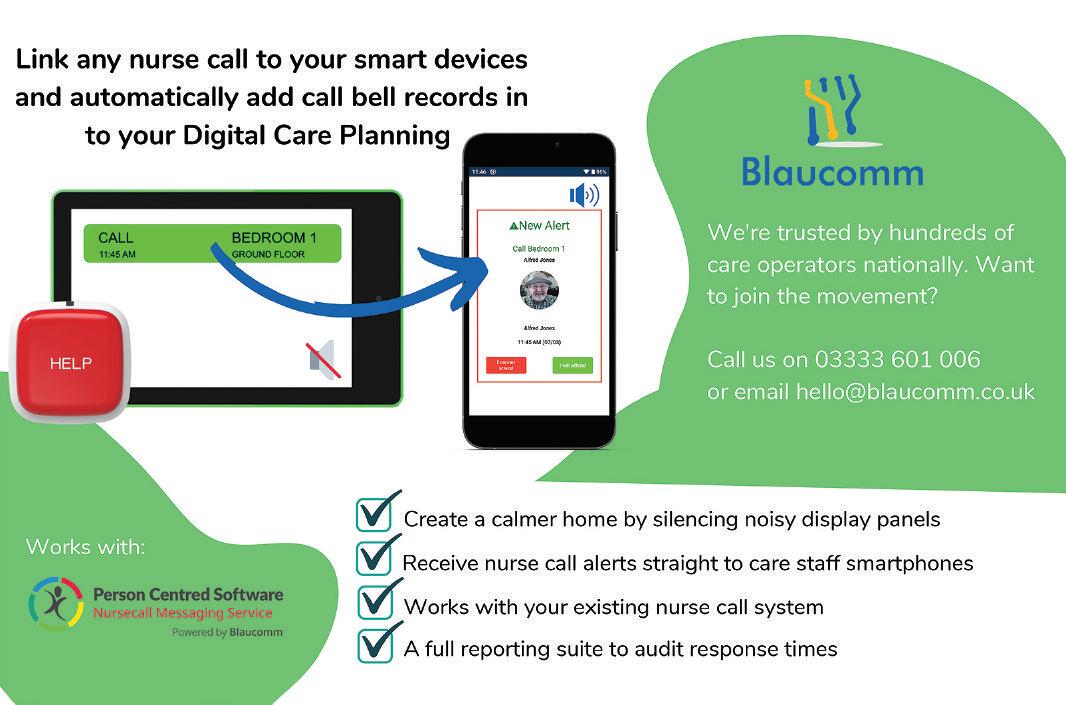


With Good Care Month just behind us at The Good Care Group we want to draw attention to the importance of balancing risk and freedom of choice in care settings
In our experience the level of freedom someone enjoys has a direct impact on their overall happiness
When older people who require care and support lack freedom it can lead to feelings of frustration helplessness and boredom but by giving them choices and opportunities to pursue their interests and exercise their independence including allowing them to pick their own activities and choose their own meals care providers can enhance their wellbeing and quality of life
An assessment of an individual s mental capacity under the Mental Capacity Act is important to ensure that every individual has access to care that enables them to maintain a baseline of freedom and independence, ensuring patients can remain in their own home as long as possible However, mental capacity is assessed on specific decisions and is not something that should be used as an overall assessment of an individual s capacity
In this article I’ll explore how we achieve this at The Good Care Group through taking an individualised and bespoke approach to care THE IMPORTANCE OF INDEPENDENCE
It s vital to ensure people receiving care have a baseline of independence and it s therefore important that care managers take the time to assess a client’s specific needs and to determine what they want and what their desires and wishes are
If an individual has always gone to bed at six o’clock in the evening and has always got up at six o’clock in the morning that is their choice and we make it our priority to work around them and their desires and needs
With clients who have capacity we talk a lot at The Good Care Group about positive risk taking and the ability to make unwise choices as part of the Mental Capacity Act So although we would prefer a client didn’t go out on their own at 10:00 at night for their walk because of the potential risks associated with get-

By Jackie Cooper, Occupational Therapist
ting lost and potential falls from the client s perspective they ve been doing this for years and understand the risks
We now have a system in place which we call positive risk taking where we sit down with clients and go through our concerns and their understanding of the risks they’re taking as well as some of the consequences of them taking those risks Some people will make risky choices but not really understand what the impacts are, so it’s crucial to evidence that the discussion has taken place
A client s spiritual needs also come into this discussion as it may be for example that they wish to take a walk on a Sunday morning by themselves, and we can therefore have conversations about the safest way this can happen
EMPOWERING CARE STAFF
Ensuring resources are put into training care staff to consider the balance between risk and freedom of choice, is vital
At The Good Care Group we prioritise working with clients and family members on individualised care plans and design these with clients wishes and needs in mind
We are focusing heavily on enrichment at the moment which involves not just focusing on providing physical care but providing and supporting them with activities that enrich and add to their lives
For clients who are living with dementia we are in the process of training our carers on Individual
Cognitive Stimulation Therapy where they will be able to deliver this in structured 20-minute sessions and involves taking part in a creative activity, or a hobby such as gardening or baking alongside quizzes and reminiscence activities This enables carers and clients families to spend quality time with the client by providing stimulation and meaningful activity
Technology in care settings can help monitor and mitigate risks without impinging on freedom
For example we have a system called the Client Community at The Good Care Group which allows family members to be involved in decision making and easily view daily care notes This enables clients to spend more time with both carers and family members on more enriching activities as all parties will have instant visibility of any care incidences and whether this has been managed adequately
Electronic Health Records are also of utmost importance in creating and maintaining personalised care plans that are easily accessible to all carers involved With less time being spent on administration and checking using antiquated systems the more time can be spent on focusing on an individual s care needs
To conclude it’s vital that care providers work with both individuals and families to ensure care plans are empowering making sure individuals feel free to choose how they live their lives People are complex and come in all shapes and sizes and care providers should not take a one-size-fits-all approach By taking the time to consider a person’s emotional, health and spiritual needs, all while balancing this with the risks involved in care this will ensure individuals receive the care they need and deserve


and
• They can be bought as seen or refurbished and sign-written to your own requirements
• Fully serviced, new mot & warranty • Engineers inspection supplied if required


Better targeting of existing money spent on prevention could deliver an extra £11 billion annual return on investment (ROI) and hold the key to the government achieving its goal of increasing the impact of prevention a new report suggests
The analysis by the by NHS Confederation and CF (Carnall Farrar) also found that if the upper quartile ROI was achieved across all interventions then the financial impact could be up to £22 billion per year – an increase from the £11 billion per year estimate that comes from the £5b per year of current spending
The analysis is the latest in NHS Confederation and CF s The Value in Health series’, and explores the ROI of 146 interventions spanning primary, secondary and social settings and their implications for the health and care sector
The government has pledged to move more care from hospitals into the community and to shift from tackling sickness to improving prevention

This new report shows investing in preventative measures including improving health education and housing can pay dividends in the long run
It recommends increasing investment in prevention – in particular around children and young people, exercise and smoking diabetes and cardiovascular interventions It calls for considering ROI when commissioning services – and hence investing more on high value interventions
Many preventative services in England are funded through the public health grant to local authorities but this has effectively been cut by 28% per person in real terms since 2015/16
The analysis found that the top 20 interventions by ROI were all community based and in areas such as housing improvements smoking prevention and exercise initiatives with a range of returns from £6 90 to £34 75 (per £1 spent)
This new report highlights the significance of wider collaboration outside of the NHS with the local government and other partners
The areas with the highest median ROI were education at £6 60 followed by reducing worklessness substance abuse schemes and vaccination programmes which all had an ROI of £4 THE TOP FIVE INTERVENTIONS WITH THE HIGHEST ROI WERE:
Adapting 100,000 homes where a serious fall is otherwise likely to occur – £34 80
By training healthcare professionals via clinical champions to provide physical activity brief advice –£23 70
Birmingham City Council s scheme to provide free leisure services to its residents – £20 70 Suicide / self-harm prevention (restrict access to means making transport safer & reduce harmful drinking) – £19 60
Adapting 100 000 homes where residents are likely to require treatment due to the excess cold – £17 10
The report comes after the independent Darzi investigation, which revealed that spend on acute care has risen from 47% in 2002 to 58% in 2022 while primary care has fallen 27% to 18%
Combined with the new CF and NHS Confederation analysis, this highlights the stark need for health service and local authority leaders to invest more in prevention and to focus on the highest-impact interventions

The findings are based on a systematic literature review and expansive evidence review of 96 papers with 146 unique ROIs across primary interventions secondary interventions and social determinants of health
THE REPORT RECOMMENDS THREE KEY STEPS FOR NATIONAL GOVERNMENT, NHS ENGLAND, INTEGRATED CARE SYSTEMS AND LOCAL PARTNERS:
• Invest more in prevention, particularly where we know it has impact, for example children and young people
Take an evidence-based approach to commissioning services that considers ROI as part of holistic assessment
Use data to systematically evaluate and benchmark interventions, leveraging the longitudinal data available to the NHS and the investment in secure data environments and the federated data platform
The report also suggests the need to more systematically evaluate and apply an approach that incorporates both population needs and getting the very best value for money
The findings highlight the wide variance in ROI between different interventions both within intervention categories and between studies of the same intervention type stressing the need for an evidence-based and tailored approach for different population bases
The research also further echoes the focus placed recently on children and young people by policy makers within and outside the health sector There was no ROI variance by age implying that investment in children and young people returns at least as much as with older people and is highly likely to exceed the stated ROI given the lasting effects of childhood health on adult health employment and socioeconomic status
Matthew Taylor chief executive of the NHS Confederation said: As our recent State of Integrated Care report shows, health and care leaders are committed to the government’s plans to shift more care out of hospitals but are concerned that a lack of long-term investment and planning is holding them back The current financial situation the NHS is facing means our members are having to prioritise short-term funding and performance over the long-term changes they know are necessary to put the NHS on a sustainable footing
“So it is poignant that this new report sets out yet more evidence that investing in prevention is not just good for patients and improving public health but also the economy It is clear that an initial investment in preventative schemes can pay back dividends for people’s health and the economy
Supporting people to stay healthy and preventing illness is a vital part of boosting the economy with economic inactivity in the UK having risen by 900,000 since 2020 – much of this due to those who are longterm sick
“Our members have welcomed the government s pledged to transfer more care into primary and community services as well as to shift from treating sickness to preventing sickness This is not just about improving NHS performance but will require a whole-government approach because only 20% of our health is determined by healthcare, with the remaining 80% affected by wider determinants
What we want to see is cross-government co-operation collaboration and investment on health policy recognising that that most policy that impacts people’s health is made outside the NHS ”



People from Black, Asian, and Minority Ethnic communities facing mental illness or distress encounter barriers in accessing personalised mental health care including Personal Health Budgets (PHBs) essential for their safety and recovery A report by the Association of Mental Health Providers NHS England and the Race Equality Foundation provides solutions to these disparities and offers key learnings to change this troubling reality

The challenge is particularly pronounced concerning PHBs, which utilise NHS funding to develop individually tailored care plans, providing individuals with greater choice and flexibility in meeting their health and wellbeing needs
This revelation provides an insight into how the ambitious targets outlined in the NHS Long Term Plan aiming to have 200 000 individuals benefiting from PHBs by 2023/24 a goal underscored in the Government s Integration White Paper, are struggling to be met and reach everyone However data from NHS England suggests that by the end of Quarter 3 2023-24 (December 2023) only 161 054 people had received Personal Health Budgets in England
Previous research from the Race Equality Foundation’s briefing on PHBs for Black Asian and Minority Ethnic individuals in City and Hackney in 2020 Tackling Inequalities Faced by Minority Groups in Mental Health through the Personalised Care Programme provides crucial insights into the development and deployment of PHBs for individuals with mental health problems
For instance it revealed that both medical and non-medical interventions are effective in supporting people with severe and enduring mental illness Participants with lived experience noted that PHBs work best when offered alongside medication as many rely on both to manage their mental health effectively
The issue is that the transformative nature of PHBs is not being met for Black, Asian and Minority Ethnic individuals
Expanding on this research the Tackling Inequalities in Mental Health through Personalised Care Development Programme, a partnership between the Association of Mental Health Providers and the Race Equality Foundation has worked to enhance access to personalised care for Black Asian and Minority Ethnic communities in the Northwest and the Northeast and Yorkshire By focusing on tangible actions for local health and care systems to
facilitate continuous improvement, this programme showcases the potential of personalised care in addressing mental health inequalities with insights applicable nationwide
Key lessons from this initiative include restructuring the relationship between lead commissioners and operations promoting collaboration among commissioners and senior leaders and addressing tensions in PHB implementation
Engaging with both those in need of support and those providing the services is crucial for addressing inequalities While local organisations possess deep insights into community dynamics and personalised care smaller voluntary and community groups often lack familiarity with PHBs and the necessary infrastructure for participation Therefore integrating trusted smaller organisations into PHBs requires consideration of their developmental needs facilitated through collaboration with larger Voluntary Community and Social Enterprise (VCSE) entities
Kathy Roberts, Chief Executive of Association of Mental Health Providers states: The findings of this programme provide local health and care systems with a clear set of actions to ensure that people from Black Asian and minoritised ethnic communities who experience poor mental health can access the personalised care and support including PHBs that they are entitled to The programme has also confirmed the need for local systems and their statutory leadership arrangements (i e Integrated Care Boards and local authorities) to engage meaningfully at a strategic level with the VCSE mental health sector in identifying the mental health needs of people from Black Asian and minoritised ethnic Communities and in the provision of services for them The Association is committed in working with national and local health and care system leaders and other partners to support the adoption of the recommendations of this programme ”
Jabeer Butt Chief Executive of the Race Equality Foundation states: “The programme has amplified the existing evidence base that demonstrates the importance of PHBs and personalised care in facilitating better mental health outcomes for some of the most marginalised and excluded people and communities In identifying actions required to mainstream the accessibility of both the Association and the Race Equality Foundation hope the learning from this Programme will be adopted by all local mental health systems and Integrated Care Boards ”
It will come as a surprise to no one that care is approached differently, in different parts of the world









Cultural differences make an enormous difference In France there are dementia villages without boundaries to the surrounding town but through design the residents stay put and people from town come in to enjoy shared experiences with them

In Japan, where there are simply not enough younger people to look after the elderly they have devised clever design strategies which allow them to operate with lower staff ratios than we generally employ in the West The concept of an information hub related specifically to care retirement and dementia interiors led to the development of the ThirdAge Design podcast and website with listeners in 63 countries Why was this necessary?
UNLOCKING RESEARCH
The breadth of this topic is enormous, and operators, designers and architects are generally time-poor
The Universities of Sterling, Newcastle and Hertfordshire are wellrespected in conducting research but
a wider breadth of information available from other countries which we might adapt to suit UK needs
Generally this must be accessed via individual academic portals to which you must subscribe which can be both time consuming and expensive Simply put the research tends not go to the people who can implement the work
INTERNATIONAL INSIGHTS
Supported by Wissner-Bosserhoff The Third Age Design (TAD) provides an interactive international community hub for care retirement and dementia design with transcripts translated into 12 languages in addition to English The hub subscription is free by signing-up at www thirdage design where the podcast can also be accessed in addition to all usual podcast platforms Topics include: the impact of AI on care settings, elegant bariatric design, and ‘Design Rules and How to
The Care Quality Commission (CQC) is taking steps to rebuild trust in its regulation
In July this year a damning interim report from a government-commissioned review revealed significant internal failings hampering regulator s ability to identify poor performance in health and social care providers
The report led to health and social care secretary Wes Streeting declaring that the CQC was “not fit for purpose” with inspection levels still well below pre-Covid levels a lack of expertise among inspectors inconsistency in assessments and problems with the CQC s IT system
Furthermore, social care providers were waiting too long to be registered and have their ratings updated affecting capacity levels in local areas, said the interim report of Dash’s government-commissioned review of the regulator
The road to rebuilding trust the CQC says involves making immediate changes to support its response to the recommendations in the interim report from Dr Penny Dash and to improve ways of working ahead of the publication of the final report
TO INCREASE THE NUMBER OF MONTHLY ASSESSMENTS, THE CQC PLANS TO:
Score at quality statement and rating at key question level
Use evidence categories to reach a quality statement score
Use professional judgement to ensure accuracy
• Streamline processes using improved technology for factual accuracy checks and provider registration
• Provide updates to the provider portal in the coming weeks
As well as its Regulatory Approach Advisory Group the body says that it is planning a series of roadshows for providers to enable them to connect with local CQC teams learn more about specific aspects of our assessment approach and take part in activities to co-design the improvements to be made
Reacting to the announcement Professor Martin Green OBE Chief Executive of Care England commented: “Dr Penny Dash released the interim review into the CQC s operational effectiveness in July Yet three months later, the sector remains in the dark about how the CQC intends to address its deep-rooted issues Today s announcement offers more of the same – promises of transparency, quicker assessments and clearer reports – yet fails to deliver the tangible actions providers desperately need ”
“The absence of measurable Key Performance Indicators (KPIs) and defined timelines in this plan points to a continued lack of accountabili-
ty Providers need concrete benchmarks not vague assertions of ‘immediate changes’ and ‘pilots’ that provide no certainty for improvement Without a clear actionable roadmap trust cannot be rebuilt
“In its announcement, the CQC confirmed several changes, including the recruitment of a new Chief Executive and the appointment of three Chief Inspectors to enhance leadership Additionally the CQC is reviewing its single assessment framework in collaboration with Professor Sir Mike Richards and the Care Provider Alliance ”
The CQC also announced several pilot projects including efforts to improve relationships with providers, starting with NHS trusts and later expanding to other sectors aiming to refine management oversight and assessment processes These initiatives are set to conclude early next year with implementation thereafter ”
Martin Green Continued: Since the interim review we ve waited for meaningful action but are once again faced with vague immeasurable commitments The sector cannot continue to operate in this regulatory vacuum Providers were expecting a strategic overhaul of CQC processes, but instead been given ambiguous changes without clarity on how inspections and regulatory decisions will improve ”
It is vital that the CQC recognises that if a care provider were to present an action plan without measurable evidence of change they would be rated inadequate We need to see that same level of accountability applied to the CQC The ongoing delays in registration and inspection processes create a ripple effect that affects the entire health and care ecosystem We had hoped for concrete plans from the CQC by this stage yet we are left disappointed Without such the sector remains in a state of uncertainty ”
“The time for promises has passed Providers urgently need concrete actions specific deadlines and real accountability from the CQC The future of adult social care depends on it ”
Care England immediately calls on the CQC to outline specific KPIs and timelines to a clear understanding of when improvements to assessments registration processes and reporting will be delivered
Martin Green Concluded: The CQC needs to practice what they preach To use their own words care providers demand


Prevent ever yday wear and tear with Yeoman Shield’s extensive range of easy-clean, wall and door protection
Our attractive, maintenance free, hygienic products protect healthcare environments from costly impact damage, making repainting and repair a thing of the past
Blending with decors, and available in primar y dementia-friendly colours, our designs can include signage, to promote the well-being of patients and aid wayfinding
But we don’t stop at walls Our Fire Door Ser vices are specially designed to offer an extra layer of safety in care settings From regular inspections and repairs to complete replacements, Yeoman Shield’s fire door ser vices help you meet all relevant safety regulations, giving you peace of mind
By Hervé Chapron, SVP & General Manager EMEA, Semarchy (www

Safeguarding sensitive data and cybersecurity in the care sector remains a major concern calling for a high degree of data integrity
Yet a recent report revealed that 30% of CQC registered care provider locations lack up-to-date security measures This alarming statistic highlights the urgent need for a robust data management system to protect devices resident confidentiality clinical outcomes and financial resources
OF CYBERSECURITY THREATS
Recent statistics on cyber-attacks targeting healthcare and care providers are worrying The European Repository of Cyber Incidents has recorded a significant increase globally with the number of events rising from 32 in 2022 to 121 in 2023 This rise exposes the critical vulnerabilities that care providers face
Care England outlines several specific threats including data breaches that involve unauthorised access to resident or staff records, leading to identity theft, fraud and privacy violations Ransomware attacks are another major threat where malicious software can encrypt critical files rendering them inaccessible until a ransom is paid
Phishing scams are a further concern as fraudulent emails or messages may trick staff or residents into sharing sensitive information or clicking on malicious links
Cybercriminals can also exploit network vulnerabilities due to weak infrastructure or outdated software and hardware to infiltrate systems Therefore healthcare providers must understand and address these vulnerabilities to prioritise cybersecurity measures and stay vigilant against evolving threats
Equally outdated or insufficient security measures can place some healthcare providers at significant risk of digital exclusion impacting the care homes future As the world increasingly relies on technology those who lag in adopting sufficient cyber defences may find themselves left behind PREVENTING DISRUPTIONS
Ransomware attacks and data breaches can incapacitate care facilities Recently in the UK a blood testing centre for the NHS was targeted in a ransomware attack Personal patient data was compromised, and there were significant delays in patient care Attacks like these These attacks not only compromise care resident’s confidentiality but can also disrupt essential healthcare services Such disruptions create a domino effect potentially placing numerous lives at risk
Operational efficiency also suffers Care facilities may face hefty fines for not protecting their resident’s information, plus the costs of restoring data and systems
Ensuring seamless and uninterrupted care services is essential for the well-being of care residents and the protection of carers as well Secure data systems play a crucial role in maintaining high service quality by enabling continuous healthcare delivery
PROTECTING RESIDENT CONFIDENTIALITY
Respecting care resident’s privacy rights isn’t just an ethical requirement but also a legal obligation Implementing the following three actions will ensure care facilities comply with both:
• Multi-factor authentication (MFA)
Implementing MFA to your internal system introduces additional security layers requiring external verification for login access This measure significantly diminishes the risk of unauthorised access as a potential intruder might breach the first security layer but will be stalled at subsequent ones
• Employee Training
Educating staff on data security and best practices such as recognising phishing attempts and crafting secure passwords is crucial This boosts their awareness and minimises human errors that compromise the system
• Data Encr yption
Care providers can add a critical layer of security by encrypting resident data both during transmission (in transit) and while stored (at rest) Encryption renders the data unreadable to unauthorised people protecting sensitive information from potential breaches
ENHANCING CARING OUTCOMES
Care providers who manage multiple facilities can find it challenging to keep up with increasing data volume and complexity from a multitude of sources Knowledge transfer can also be problematic with highsecurity risks There is both the data from the business and the data of care residents that needs to be protected
However, with a comprehensive data management system, care providers can leverage the power of all data regardless of source to ensure data integrity When data is correct and readily available decisionmakers can rely on it to make well-informed choices that enhance operational efficiency and strategic objectives
Data management systems are indispensable in healthcare for protecting devices, securing patient confidentiality enhancing clinical outcomes and safeguarding financial resources As cyber threats evolve the care industry must remain vigilant and consistently update its cybersecurity practices to stay ahead of risks and ensure optimal protection for all stakeholders but most importantly the people they care for
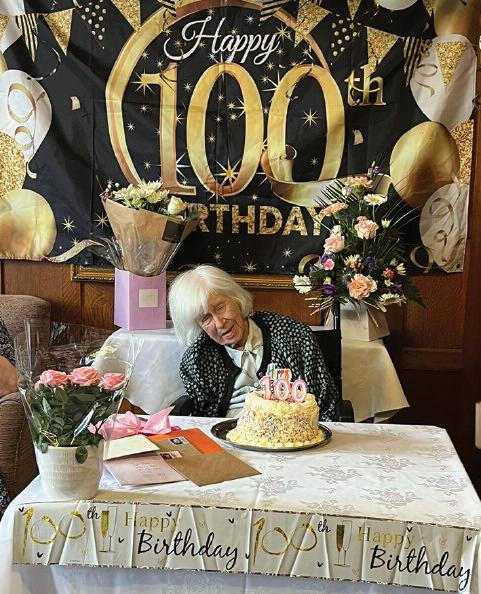
As

courses this year This unique addition provides excellent value and a fully robust training package
SCTV are delighted to have won several awards over the last 12 months including Best Online Health and Social Care Learning Platform’ – Global Health & Pharma Social Care Awards 2024
• ‘CPD Provider of the Year’ – The
wellbeing of social care workers
SCTV believe that high quality training should be accessible to all and offer regular free courses which include a digital certificate accessible via their website
The company stands behind a clear mission and set of values which define their ethos and their dedication to both the Care Sector and those within it These can be viewed at: Mission Statement and Core Values - Social Care TV (www social-care tv/about/mission-statement-and-core-values) Social Care TV are a responsible business committed to ensuring that their actions have a positive impact on their employees customers the wider health and social care community and

by the Department of Health and Social Care in late 2023 The fund committed £42 6m over two years to “support innovation and scaling in adult social care and kick-start a change in services to support unpaid carers
Local authorities were invited to submit expressions of interest to receive the funding for specific projects working in partnership with health and care providers local carer services and carers themselves
Although the first half of the funding has been paid out, the second £22 6m tranche has still not been allocated despite being due for payment in August
Neither Carers Trust s network of local carer organisations or local authorities have had any indication from the Department of Health and Social Care on when the funding will come, or even confirmation that it will be paid at all In a recent debate on unpaid carers the Government did not mention the fund as one of its initiatives to improve support for them
Carers Trust is demanding that the £22 6m is confirmed by the Chancellor Rachel Reeves in her Budget later this month
Carers Trust s Policy and Practice Manager Andy McGowan said: The UK s 6 million unpaid carers are struggling and in desperate need of more identification and support The Government urgently needs to honour its commitments to them and provide the rest of this funding At a minimum, that needs to happen at the Budget later this month ” Without this money more than 100 crucial projects could be scrapped The timing would be catastrophic coming just as we enter the winter months when pressure on social care and carers is so acute ”















quality care
In my experience as Group Quality Manager at Renaissance Care where I oversee the care provided across 17 homes in Scotland I have seen firsthand how effective leadership can transform both the work environment and the quality of care delivered My journey in this industry began over 20 years ago working as a staff nurse in a care home And, as I advanced through various roles, from nurse to home manager Operations Manager and now Group Quality Manager, I have always seen leadership as the foundation of
By Lynne Meshki, Group Quality Manager at
One of the biggest responsibilities of any leadership role, within the care industry in particular is creating a positive work culture Within our homes that culture directly impacts the quality of care our residents receive If staff feel supported valued and part of a community it shows in the work they do But achieving this is near impossible if we don’t lead by example
At Renaissance Care we ve fostered a supportive friendly and passionate environment Our culture isn’t just something we talk about; it’s something we live and breathe every day
Across the Group we have newly developed wellbeing teams within each care home Previously known as activities coordinators, we revamped their roles to showcase the monumental role they play in enhancing residents social and mental wellbeing Each quarter we focus on key areas of importance such as nutrition, hydration, skin health safety and overall health and we assign champions to lead these initiatives By empowering staff to take ownership of specific topics we not only enhance their knowledge abilities and confidence but also improve the standard of care for residents
As a leader, it s also crucial to set clear goals and maintain high standards I have oversight of all care plans in our Group carefully monitoring critical risks and ensuring that our residents are being cared to the highest possible standard Every day I see the difference it makes when we take a proactive approach to care whether it s through auditing, observing staff, coaching or continually developing staff skills through training
I’ve been in my current role for a year now and while I ve found my footing I’m always learning and striving to improve I work closely with all of our care home managers through our Lessons Learned group where we share insights and experiences to make sure we’re constant-
ly evolving No leader no matter how experienced should ever stop learning
A focus on continuous improvement is particularly important in areas such as palliative and end-of-life care where residents and their families require the highest level of compassion and expertise to ensure they experience a positive journey By investing in staff development and fostering a culture of learning, we can ensure that care homes not only meet regulatory standards but exceed them – a level of care that residents and their loved ones expect and that we are wholly committed to providing
A perfect example of this was Florence, a resident who arrived with us at one of our Aberdeen care homes in 2021 Florence was only 58 years old at the time but due to a serious infection in her leg and subsequent amputation required end of life care Florence was only given six months to live at that time but stayed with us for two and a half years
With the support of the team and their recognition of Florence s desire to recover and live independently once again she made an incredible recovery and was able to return home earlier this year reunited with her loving husband of 34 years
Stories like this are truly a testament to the profound impact of strong leadership Our homes consistently achieve high-performance levels because when you lead with integrity set clear goals and foster a culture of care the positive effects ripple through
As I look back on my journey from staff nurse to Group Quality Manager I’m proud of the positive changes I’ve been able to influence and I’m excited about the future Leadership in care isn’t easy but it’s incredibly rewarding because, at the end of the day, it’s all about making a difference in people’s lives and creating positive outcomes for all

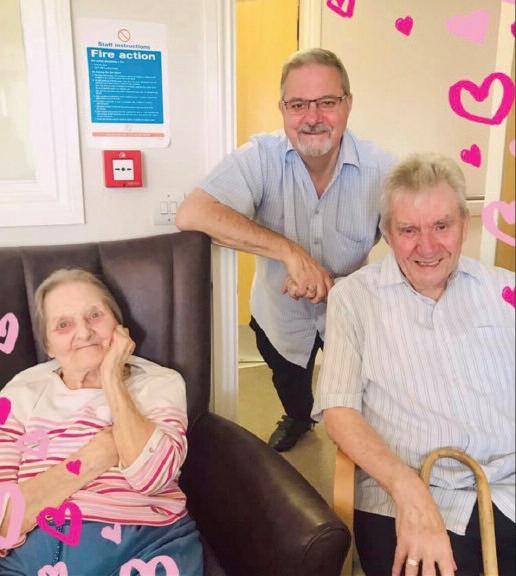

Suzie s journey in care has been shaped by experiences that deepened her passion for supporting others This is a story about her journey in care from discovering her calling to finding a place where she truly belongs
JOURNEY IN CARE BEGINS
Her journey began in 2009 when she first started to work in care homes in Frome However no sooner than starting her new career Suzie needed to be at home to care of her father due to illness which she did until he very sadly passed “It took me a while to get through that, but when I felt ready I told myself OK I m stepping back into my career and back into care ” She found herself on a job searching website scrolling through the many opportunities when one particular advert caught her eye and she applied this was for a Care Assistant role at Frome Nursing Home
I ended up with a job interview with Jay that was fun! Suzie shared how relaxed and comfortable she felt in the interview and during the home s show around that was the deal breaker for me it didn t feel like a dead set interview, I felt like I could actually get on really well with the team in the home and be myself Suzie said that walking out of the interview left her with such a good feeling, when offered the role, she took it straight away without hesitation!
EMBRACING COMPLEX CARE
By Macey Ryan, Communications

As much as she loved her role at Frome, a few years in, Suzie needed to take some more time for her family her son and although she tried to juggle home and work life it was best for her family at that time Suzie explains “my son who has autism needed me and working 12 hour shifts, although I was only working for the 3 days didn t give me the quality time for him I did temporary work during school hours but I really missed everyone at Frome ” But then when the time was right Suzie found herself walking through the home’s doors once again “When looking to go back into work there was many choices in Frome it was a no brainer for me though I was definitely coming back here now home life settled with my son It felt like home and a part of me I love pushing my boundaries and still learn more each day, I see the family members here as my extra family I was definitely never going to drift afar
So she purposely chose to return to Frome after supporting her son with autism due to the complexities of the family members and one main factor that stood out to Suzie that was the home is different from anywhere she had worked before “What got me was the independence of the family members especially that they were on different stages of their dementia journey and some had complex behaviours yet their independence was highly encouraged which I ve never experienced at other care services I ve worked at before I was able to see people in their late stages of dementia or with a complex need and they were supported to have a quality of life without sedation whereas anywhere else I ve worked it s not like that as a carer at Evolve we learn to embrace each individuals complexities that often comes with dementia ” Suzie explains further why complex care? I had worked in previous homes and saw a basic understanding not being met; people living with dementia were struggling to be understood and then labelled as difficult or challenging often then being moved to another service which was just cruel and they saw that place as their home This upset me all because the team couldn't cope or have the proper training to learn and understand I m a people pleaser and would always try my best to help and get things right Everyone even those without dementia can be misunderstood at times
“When I came to Frome I saw family members bond with team members on a level I d not seen before, and I loved it Yes it s difficult when we sometimes spends hours trying to understand a person s needs but team members I work with will not give up on meeting someone's needs The relief when we figure it out and see the happiness it brings to that family member is great Words and actions can be mixed and some-
times someone who is complex may only be able to communicate physically or may be repetitive in their communication But at Frome this is not seen as difficult behaviour It s great to see what s considered complex care being embraced, and family members given a new lease on life Let s face it everyone loves someone with character This is their journey now, and anyone caring for someone with dementia has to take that ride with them which comes with the good and the bad and a whole lot of emotions The better you understand someone the more you can provide 100 times better care for that person ” Nursing homes that I ve worked for in the past haven t had complex care They understand dementia, but not entirely as it progress’s into its later stages Looking back Suzie can now reflect on how significantly different her previous workplaces were to Frome, and confided that one in particular stood out in her memory It looked like a hotel everything was for show and everything had to look premium it wasn’t about the people for example if somebody was to wander and take something off the wall out of curiosity they would be removed because it s a bad scene to set Whereas at Frome we’d consider that to be normal behaviour for someone going through their dementia journey
Now 5 years on Suzie has progressed in her role she started as a Care Assistant and with the support of a career pathway mapped out she progressed onto a Team Leader and now a Care Practitioner and is still looking to the future During our Care Practitioner course it gave me a kick up the bum and made me think you know what? I can do this! I d love to be able to go on a nursing course and if I were to ever become a nurse I couldn t see myself working in a hospital I would definitely stay here as the training is another perk about my job, it’s really out there and imaginative and different from other places I’ve worked, it s through the roof!
When asked of her favorite memory during her time at Frome Nursing Home Suzie laughed God there are so many!” After a short thought, one particular memory struck her “We have a family member who loves and used to ride motorbikes Me and my husband were involved with the Santa On A Bike event so we took lots of pictures videos and put together little clips I remember showing this particular family member one day and he started to cry Not because he was upset or distressed it wasn t a sad cry He was so emotionally moved because this is something he is passionate about and has been all his life he couldn t go out at that time so being able to bring that to him and bring out that kind of happiness and emotion within someone has always stuck by me
As she looks back over the course of her years at Frome Suzie gave one piece of advice for anyone beginning their career in care “Just be yourself if it’s something you genuinely want to do because you’re caring and want to make a difference you can t go wrong just be you Speaking from the heart Suzie also shared that Frome will always be her second home “I’ve brought my children here they know the family members and my son who is now 15 will ask about them so to me that is my home from home
Frome Nursing Home’s approach to a continuation of life means that those within their care, however complex they may be can have their life s journey continued with as much normalcy and independence as possible The Evolve Care Group offers you and every team member over 100 hours of face to face training during quarterly sessions at the Evolve Care Academy training center in Bristol “ I’ve learned so much my views on everything to do with adult social care and dementia care has changed for the better
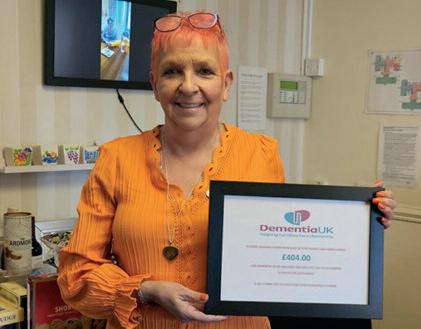
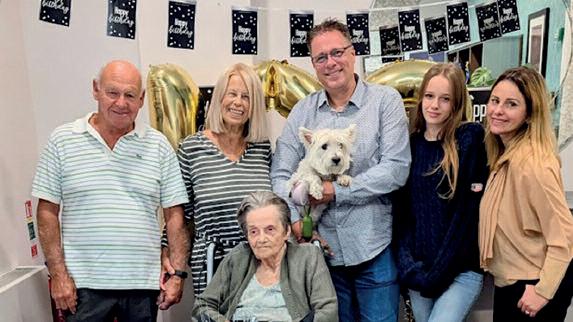
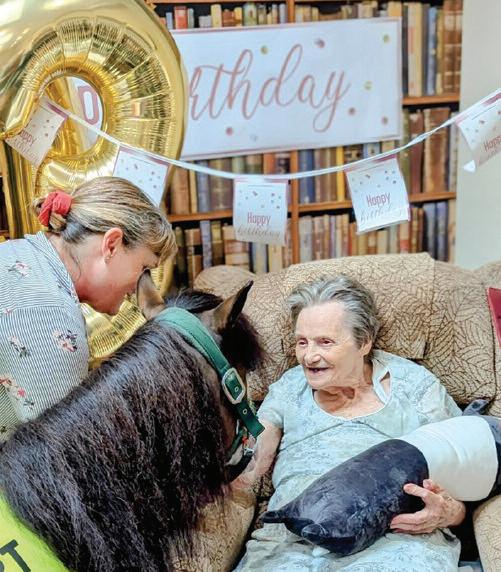

Business property adviser Christie & Co has launched its Care Market Review 2024 report which analyses a range of topics relating to the UK healthcare business market including capital markets land and development the transactional market shifts in local authority fee rates operator sentiment the finance landscape, and a Q&A with Matt Lowe (CEO at LNT Care Developments), along with a spotlight feature on the German market
Due to the strong needs-driven underpin and defensive characteristics of the sector healthcare remains a highly attractive asset class to investors says Christie & Co However the higher cost of capital has been a key issue for investors This is illustrated at a macro level by the increase in the Bank of England base rate from 3 5 per cent at the start of 2023 to 5 25 per cent at the end of the year This increase was driven by wider inflationary pressures with other important metrics like 10year UK Government gilt yields increasing to a high of 4 6 per cent in August 2023
As we move into the second half of 2024 there are clear signs that yields have stabilised with market activity picking up – with a steady increase in the volume of investment activity, a number of major processes being launched, and more funds looking to actively participate as buyers This reflects a combination of new capital entering the market and existing funds becoming more acquisitive It is illustrated well by both real estate investment activity and wider corporate/private equity transactions
The supply of purpose-built senior housing is significantly behind that of other developed countries but delivery volumes and planning activity are now steadily increasing in the UK Recent schemes in the UK have generally catered for either the luxury or affordable ends of the market but newer entrants are targeting the mid-market where there is the attraction of mass demand Established retirement living providers have continued to bring forward schemes of 50 to 80 units in urban areas close to high street amenities However Christie & Co is increasingly seeing successful applications for larger Integrated Retirement Communities (IRC) products
An analysis of Christie & Co’s transactional data revealed an increase in the proportion of larger care home sales in the first half of 2024 with the sale of assets over 40 beds comprising 58 per cent of its total volume compared with 52 per cent in 2023 Meanwhile the percentage of sales of homes with under 20 beds dropped to 11 per cent of its volume broadly similar to 2022 figures
The proportion of transactions concluded to new entrants in the first half of 2024 was over double that of 2023 at 9 per cent The number of first-time buyers was at an all-time low in 2023 reflecting a tough lending environment in 2022 together with a sector that was still recovering from the pandemic Small and medium groups were the most active buyer group in the first half of 2024 representing 33 per cent of Christie & Co’s completions However, the number of deals concluded to larger groups declined, shifting from 36 per cent in 2023 to 29 per cent in the first half of 2024 This is likely to be due to the softening of yields in 2023, reducing activity in the sale and leaseback market
An analysis of the vacant possession deals transacted in 2023 shows that 58 per cent were sold to care-related buyers 24 per cent of the transactions were to buyers seeking to convert the property to a specialist care facility and 20 per cent of buyers sought to reconfigure the property and re-open as an elderly care facility 27 per cent of closed care homes sold through the broker went to residential developers
Christie & Co analysed a Freedom of Information Act survey covering all 174 local authorities across England Wales and Scotland It found an average residential fee increase in England of 9 per cent compared with 9 5 per cent in 2023/24 Fee rate levels remain a challenge in some areas, with the increases being insufficient to offset inflationary cost pressures, and Christie & Co expects that the burden on the self-funded client base is likely to rise, with the majority of providers achieving private fee increases of between 5 per cent and 10 per cent or more
Christie & Co interviewed a cross-section of local and regional care providers throughout the UK to gather their sentiments on the sector
THE SURVEY REVEALED:
60 per cent of operators in the UK have a reduction in agency usage over the last 12 months whereas only 13 per cent stated agency usage had increased 75 per cent of providers in Wales reported a reduction in agency usage with only 50 per cent of Scottish providers reporting a decline
• 59 per cent of operators reported an increase in local authority fee rates
• In Wales 88 per cent of providers reported local authority fee increases of between 5 per cent and 10 per cent As in England, there is a huge disparity in baseline local authority fees, with a 29 per cent difference
between the highest-paying authority in Wales to the lowest Private fee rates increased across all country regions with 63 per cent of operators reporting a 5 per cent to 10 per cent increase 18 per cent of respondents reported increases of over 10 per cent compared with 36 per cent with local authority fees suggesting that there has been some improvement on the LA side to align fees
62 per cent of surveyed operators from England reported a 5 per cent to 10 per cent increase in private fee rates and 27 per cent of Welsh-based providers surveyed increased their private fee rates by over 10 per cent
• In England and Scotland over 40 per cent of respondents are looking to expand their portfolios whilst sentiment is stronger in Wales where 67 per cent of respondents are looking to acquire in the next 12 months
Given the uncertainty around interest rates, there remained some degree of caution from operators, with a quarter still unsure over their appetite going forward
In a section on the finance landscape, Christie Finance notes a positive sentiment from funders lending into the sector and an increase in demand for finance with the broker having completed 23 per cent more transactions in the first half of 2024 against the 49 per cent increase in offers of finance
There has been an increase in operators seeking unsecured business loans and asset finance to support refurbishment upgrade and improvement projects which in some cases have been put off due to external pressures and a perceived lack of access to finance of this nature These types of projects made up 40 per cent of lending within the sector in H1 2024
Additionally, in a survey of lenders, when asked about the key challenges they face when underwriting a transaction, 18 per cent said regulation and 22 per cent said client income/turnover When asked about their bank’s opinion of the UK economy over the next 12 months, 65 per cent of lenders said they expect to see growth
Richard Lunn Managing Director – Care at Christie & Co comments
We re seeing a renewed appetite from both buyers and investors in the market which has resulted in a strong level of transactional activity across the whole of our team with a big emphasis on trying to conclude deals ahead of the Budget in late October Our average deal time from acceptance of an offer to completion of the transaction has materially increased from five and a half months to nearly eight months the reasons for this are numerous including greater diligence insurance cover challenges and regulatory registration implications Clearly changes in the Budget such as important tax regimes including IHT and CGT could materially impact both deal times and the seller’s desire to transact ”
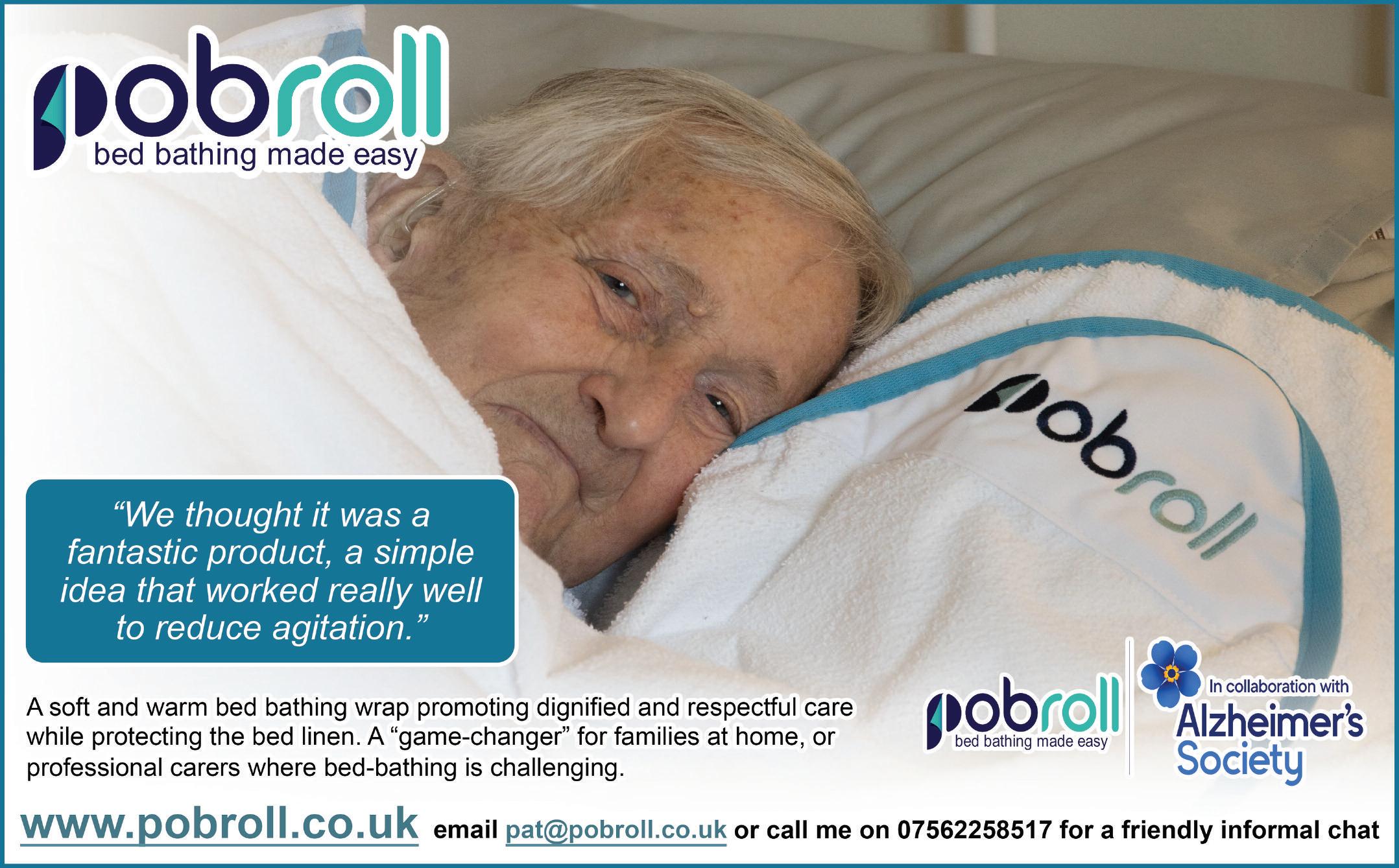
Home part of the Cinnamon Care Collection has been crowned National Association of Care Catering (NACC) Care Chef of the Year 2024
Samuel was crowned last night in front of NACC members and guests at the NACC gala awards dinner held at the East Midlands Conference Centre Nottingham which is part of

it; particularly the dietetic and nutritional values of the dishes This is an important aspect of care home catering
This is my third year as head judge and I now have a better understanding of the sector and the different
demands that are placed on the chefs This has given me an even greater respect for what the finalist have achieved over the course of this year s contest There were more entries than ever this year, which made my job even harder, which is great I would also like to praise the quality and commitment of the judges they truly believe in what they are doing and helped make a big impact on the overall performance
Neel Radia the NACC’s National Chair, said: “This year there were more entries than ever before and for the first time in recent years, we even had a heat in Wales, which was a great experience
“The judges tell me that the points tally was exceptional with only 6 points (out of a possible 320) separating the top two places This tells me that the standard of the entries is also being raised and I would join with Steve Munkley is thanking all the judges who gave their time and commitment so freely ”
Raising the Care Chef s profile is so important to us all as it helps attract more chefs into our sector I know from talking to so many of them that once they see the true value of what they can do for others they want to stay with us for a long time – and even want to compete in the annual Care Chef of the Year competition!
Speaking after the award, Samuel Sewell said: “It is fantastic being crowned this year’s Care Chef of the Year but what I took away from the competition was seeing chefs from our sector getting together and sharing their ideas I’m proud to work as a Care Chef ”



at risk of a cyber attack – but that s just not the case
Daniel O’Shaughnessy Head of Programme Delivery for Better Security Better Care at the Digital Care Hub explains:
We ve heard smaller providers say We re not of any interest to a cyber criminal – we won t get attacked ’ But what they don’t realise is that they can still be a victim even if they are not the primary target If a software system that they use is breached or attacked – they will be affected We ve seen cases where staff rosters and payments are blocked; medication records are unavailable; and sensitive data is leaked and put at risk of identify fraud
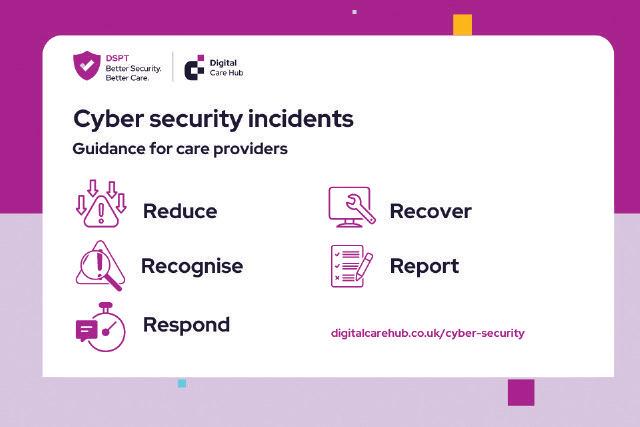
“It is absolutely critical that care providers have a business continuity plan which covers what they will do if digital systems are out of order It’s always better to plan ahead – but we know it can be difficult to know what to do in the midst of a crisis So we have published new guidance on responding and recovering from an incident ”
The guidance which launched today at the Care Show is aimed primarily at the person with lead responsibility for data security and protection within the organisation Every organisation should have a lead in place It includes the following advice on the immediate response to a cyber incident:
• Look at your security software (such as antivirus alerts and server logs) to see if you are able to identify the specifics of the attack and the cause of the incident If you are unable to do this (but you know which device has been affected) run your antivirus programme to complete a full scan and take notes of the results it gives you If nothing is found consider using an alternative antivirus programme
Do not turn off your computer – it should remain on to preserve any evidence Log-off (not shut-down) the computer and ensure no-one uses it – consider putting a sign-on to warn others Isolate the affected system or device from the network to prevent further disruptions Quarantine the computer by removing the network
cable or put it in airplane mode if connected to Wi-Fi Secure any memory discs/CDs/DVDs or other media connected to or used in the computer
Check who else has been affected speak to your software supplier(s) to find out whether they or other care providers they supply are reporting similar incidents
During the recovery phase providers should:
• Follow your business continuity plan Ensure you always have access to a grab-bag of key documents necessary to respond to an incident Work with your IT suppliers and IT support to identify the nature and scale of the issues If you manage your own IT put your business continuity plan into action Depending on the type of incident you are responding to, this may involve: replacing infected hardware; restoring data through backups; or remotely
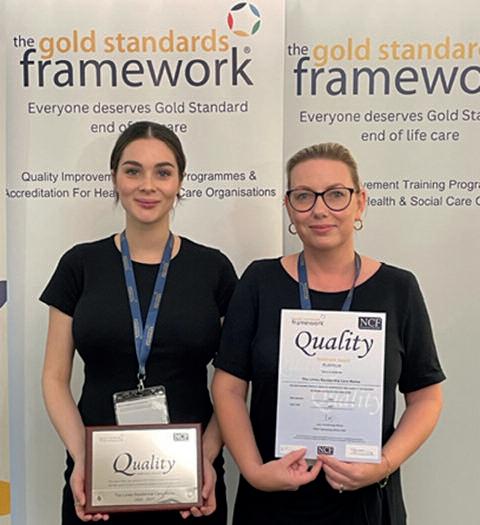
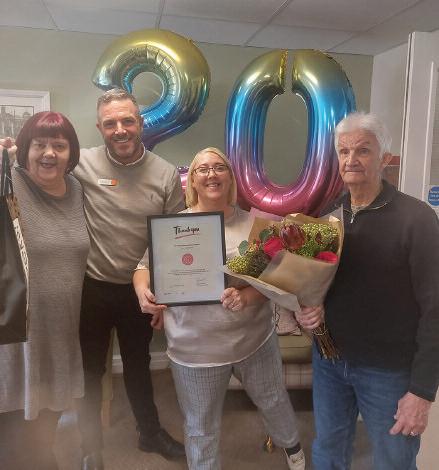

A North Yorkshire social care organisation is teaming up with the local authority to ensure local older vulnerable and disabled adults get the best care
The Independent Care Group (ICG) has won a three-year contract to be the Market Representative Body (MRB), representing all adult social care providers across North Yorkshire
A new Executive Committee will oversee the work of the MRB and will include representative voices from across the sector
Through collaborative agreements with Carers Plus Yorkshire and Community First Yorkshire the ICG is now also working with the unpaid carer segment of the market as well as community voluntary and social enterprises, cementing existing good working relationships in a memorandum of understanding with those partners
The bodies will work together to try to ensure a
consistent and high quality level of care is delivered ICG Chief Executive John Pattinson said We are delighted to sign this agreement with North Yorkshire Council to work together with the authority to deliver the best of care to people who need and rely upon that care in our communities ”
As the Market Representative Body the ICG will both act as a voice for social care providers to feed their views in to the authority and at the same time work with the authority and other social care commissioners to improve care
“I think this will put us into a unique position of working with both sides of the social care commissioning process – those who buy care services and those who provide them – for the overall benefit of the social care sector in North Yorkshire ” Mr Pattinson added
Hopefully everyone will win North Yorkshire Council as commissioners social care providers across the county and most of all those who rely upon social care services in the area It is an exciting new chapter for us all Effectively the ICG will then have three distinct functions – to work with social care commissioners and unpaid carer bodies to support its membership and to campaign and lobby at local regional and national level

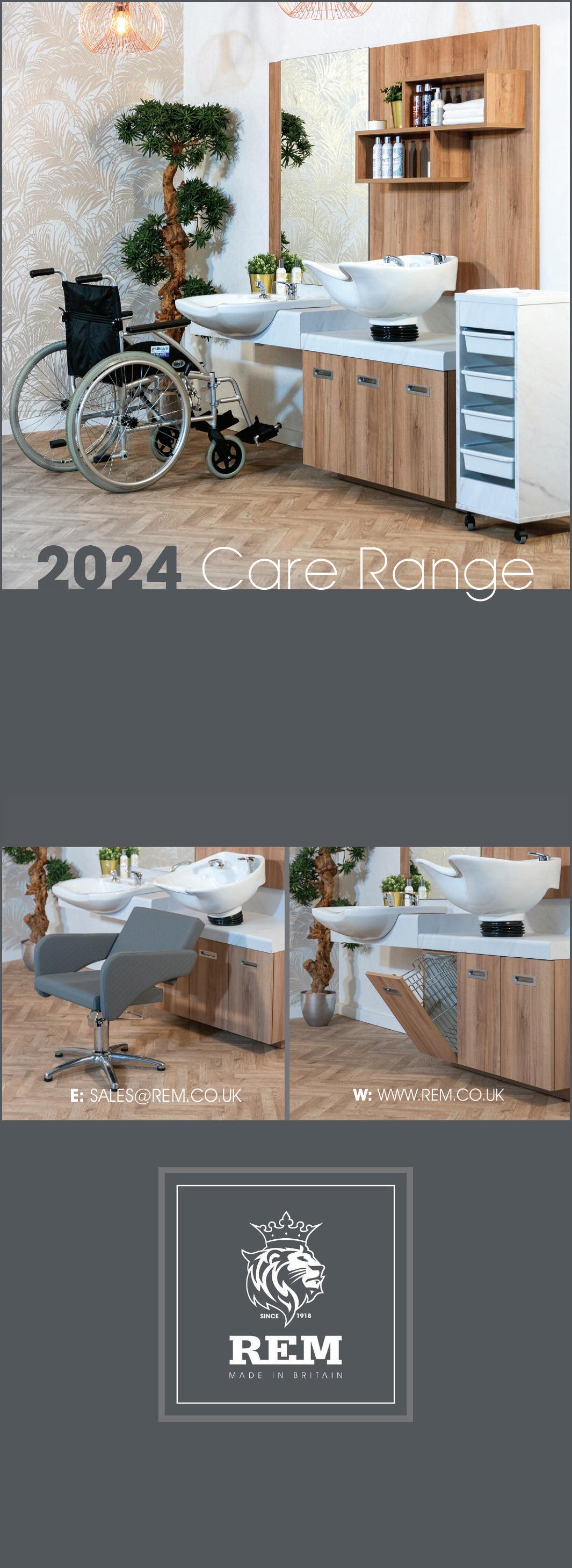
REM have been manufacturing furniture for the Hair & Beauty Sector for over 100 years and are now considered to be one of the largest manufacturers in both the UK & Europe Understanding the growing requirement for Care & Residential Home Salons, REM’s Design Team have produced the Pendle Care Range for the Small, Compact Care Home Salon For More Information on our Product Range,

HC-One
across the UK will mark World Animal Day on October 4 by paying tribute to the animal pets who live with them at the home and pets who visit them during pet therapy sessions to farm trips
World Animal Day is a day that celebrates and protects animals It is a global animal welfare movement which aims to make the world a better place for all animals
Having a pet cat residing in a care home can offer many benefits to the elderly, including enhancing therapeutic care and providing companionship Residents can also improve their wellbeing by engaging with their pet cats and they can help facilitate better social interaction

Pytchley Court Care Home in Brixworth Northampton recently welcomed a new furry addition to Pytchley Court Pytchley Court allows residents to keep pets and the latest feline addition belongs to resident David Lunn 86 who has lived at the home since December 2022
Before coming to the home David had a Siberian Husky named Stormy, which initially stayed with his daughter while he was in the care home They visited frequently but sadly Stormy died earlier this year
As a replacement David was gifted Poppy a kitten who is named after the well-known red flower and the pair have not looked back since David revealed that his new roommate reminds him of the many cats he has met over the years with his daughter
Speaking recently David Lunn resident at Pytchley Court mentioned:
“It is an unusual feeling; we are both adapting to each other, and Poppy seems to like it here
She is really intelligent - when she wants to be fed she lets me know by jumping on the bed with me and bumping me with her head!”
Sue Watson Home Manager at Pytchley Court Care Home stated:
We like to offer residents as many options as possible and give them a real sense of involvement in making their stay at the home worth it It’s all about improving the quality of life in a person-centred way Poppy is a lovely addition to the family here at Pytchley Court and David certainly seems to be enjoying having her with him ”
At Summerhill Care Home in Kendal Cumbria the home welcomed Animal Rescue Cumbria for a visit so residents could learn about how the organisation operates as a charity as well as provide residents with the opportunity to take part in a pet therapy session by bringing in some of their dogs to visit for residents to interact with
Residents enjoyed reminiscing about their former pets and talked about how owning pets can help com-
bat loneliness Animal Rescue Cumbria have agreed with Summerhill Care Home to continue visiting the home every month including hosting snuggle sessions arts and craft sessions which will allow residents to make their own kitten toys and have invited Summerhill residents to visit the Animal Rescue Centre to meet even more cats and dogs Summerhill look forward to working with the Animal Rescue Centre in the future to do more activities and fundraising events
Sean Moore Senior Wellbeing Coordinator at Summerhill Care Home said:
Supporting Animal Rescue Cumbria is a cause that is close to our residents hearts We are excited to continue to do more work with Animal Rescue Cumbria in the future
At Rose Court Care Home in Radcliffe, Manchester, colleagues arranged a fun day out for residents to Meadowcroft Farm to feed the alpacas goats and chickens Residents enjoyed feeding the alpacas then moved on to feeding the goats and chickens before moving on to stroke and hold the rabbits
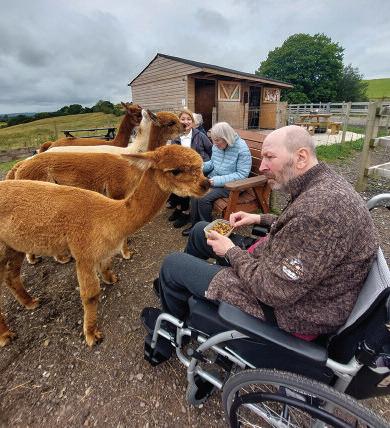

Residents thoroughly enjoyed petting the wide variety of animals at the farm and learning all about where the different animals came from Residents enjoyed learning about the different species of animals the names they had been given and about their characters and temperament
Residents then went on to enjoy a homemade packed lunch that had been made by Rose Court s kitchen team whilst indulging in the onsite teas coffees and hot chocolates
Residents enjoyed the day trip to the farm so much that colleagues are looking to make day trips out to the farm a regular occurrence in the near future
Leanne Batten-Smith Home Manager at Rose Court Care Home, commented: Residents really enjoyed the day trip out to Meadowcroft Farm to feed the alpacas goats and chickens As

“This
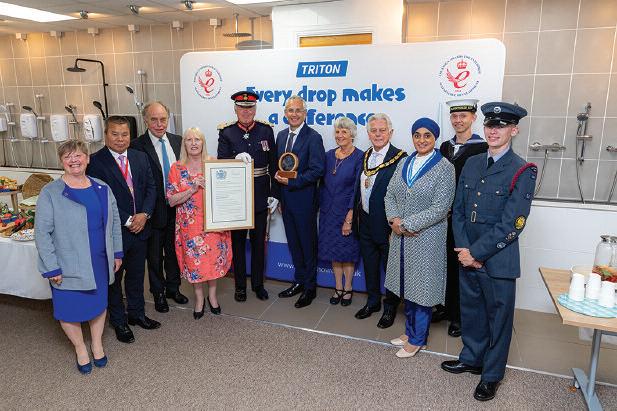

Sir Julian Hartley is set to become the CQC s new Chief Executive having served as the Chief Executive of NHS Providers since February 2023 Prior to which he had a distinguished career as Chief Executive of several organisations most recently ten years as Chief Executive of Leeds Teaching Hospitals
Ian Dilks Chair of CQC said: I am very happy that CQC will make such a strong appointment to the role of Chief Executive Sir Julian was chosen from an outstanding field for his significant leadership experience and his experience of contributing to developments in the wider health and social care landscapes
“Sir Julian is an experienced and highly respected Chief Executive with a track record of leading organisations through challenging times balancing the need to both improve short term performance and evolve strategy alongside a passionate commitment to improving people’s care He has a background in health but also has experience in and believes in the crucial importance of adult social care

CQC has much work to do to rebuild trust with the public providers and with our own staff We also await the findings and recommendations of the final review from Dr Penny Dash and of the review that we have commissioned from Professor Sir Mike Richards However I am confident that Sir Julian has the qualities and experience to lead the organisation through the challenges ahead and help to ensure that we make the right changes to become the strong effective regulator that people who use and work in health and social care services need and deserve
Sir Julian Hartley said: “I am delighted to be joining CQC at a time when effective regulation which supports improvement across the health and care sector and good safe care for people who use services has never been more important
I have spent my career in the NHS and I will do my utmost to bring all I have learned to serve people who use services and to work with CQC staff and with providers to deliver high quality regulation which
drives improvement across the health and care system
Health and Social Care Secretary Wes Streeting said: “Sir Julian’s experience of turning round large complex health organisations will be vital as the CQC seeks to urgently improve and win back public trust
“Dr Penny Dash’s interim report highlighted serious failings in the regulator forcing me to conclude it is no longer fit for purpose Once published, I will consider Dr Dash’s final report closely and set out further action this government will take But I was determined to see action taken now to begin to turn the CQC around
I m confident that Julian will provide the leadership staff in the CQC need to address this crisis improve patient safety and restore confidence in the regulator ” Care England Welcomes Sir Julian Hartley as New Chief Executive of CQC, but Warns of Challenges Ahead
Professor Martin Green OBE Chief Executive of Care England offered a tempered optimism regarding this leadership change while reminding of the enormous task that lies ahead, saying: Sir Julian Hartley steps into this role at a critical juncture for the CQC While his appointment brings a wealth of leadership experience the systemic challenges within the CQC are profound The sector has long called for urgent reform as reflected in Dr Penny Dash’s independent interim review which outlined major operational failings delays in inspections and a loss of credibility Sir Julian now has the chance to lead the organisation through one of the most transformative periods in its history ” Inheriting an organisation that is not just in need of structural overhaul but one whose ability to rebuild trust within the sector has been seriously compromised, comes as no small task; but it is one that, if executed properly could be incredibly powerful and rewarding for everyone who relies on adult social care Sir
Julian has the opportunity to create lasting change but this can only happen if the entire CQC listens to the voices of care providers and commits to delivering measurable improvements We remain ready to support the CQC in achieving this but real action and accountability must follow
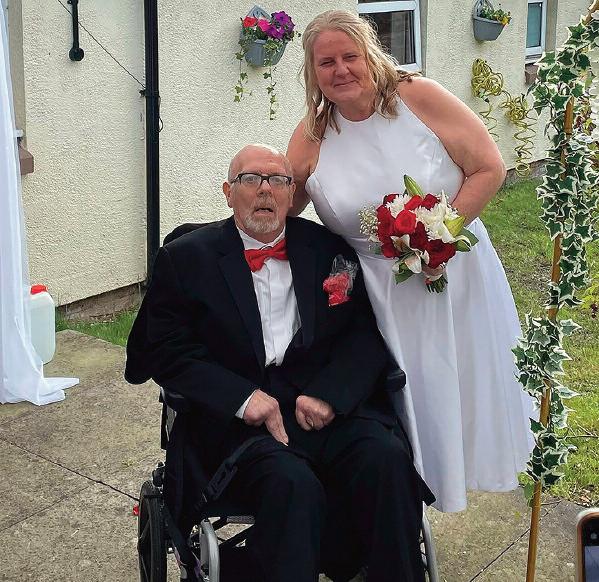
Graham Stokes Director of Dementia & Specialist Service Innovation at HC-One, commented: It was such a joyous experience to be at the Blessing of Alison and Kevin’s relationship Uplifting to feel the happiness in the smiles and laughter of their family and friends
Well done to Caroline and Team Meadow Bank for showing what is possible when you’re determined to give people the life they want
Dementia is devastating but attending the blessing ceremony showed you to never give up hope, that by thinking differently and not being consumed by despair meaningful happy times are possible Without doubt love never dies ” Natasha Wilson - Dementia Care Manager at HC-One stated: I had the most beautiful Sunday as a guest at Kev and Alison s blessing ceremony at our wonderful Meadow Bank care home
From perfect decor fabulous food moving tributes singing fizz and most importantly, a room full of pure love and devotion Dementia takes away a lot of things but never the ability to love or be loved in return “Congratulations Kev and Alison and a special thank you to the amazing Meadowbank team who support Kev with tender loving care and who made this special day happen ”
Earlier this month the Swindon and Wiltshire Innovative Technology Care Hub (SWITCH) held a training day for local Care Professionals working through Curam, the UK’s largest digital employment platform for the care sector to upskill and improve care provision in the region Care Professionals who work through Curam from Wiltshire Gloucestershire Hampshire Oxfordshire and Berkshire attended
SWITCH s three-hour Wound Care training session achieving a collegelevel certification at the end of the day During the course, Care Professionals learnt about skin integrity and how to spot changes such as pressure wounds, as well as the initial response required to prevent infection whether that is basic treatment or referral
Using realistic task trainers in SWITCH’s interactive learning suite Care Professionals were given an accurate and bespoke sense of what wounds may look like on their clients and how they should react The session highlighted how skin wounds manifest on different skin types to instil cultural competency
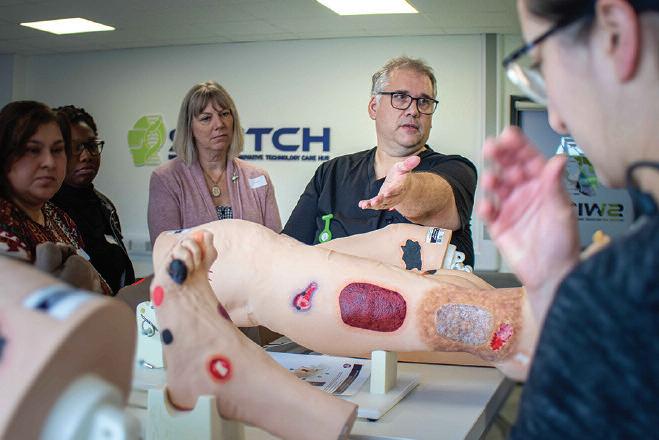
The immersive suite at SWITCH simulates healthcare environments through projections, smells and a family of life-like manikins which can talk cough cry and realistically react to care interventions This helps Care Professionals develop healthcare skills and softer skills such as patient interaction in a simulation setting The hub was funded under the Skills Development Fund from the Department for Education SWITCH provides mandatory and clinical skills training to upskill care professionals across the region
The session also acted as a networking opportunity allowing Care Professionals who work for Curam on a self-employed basis to come together as a team and share experiences and best practices
The initiative reflects Curam and SWITCH’s shared ethos of improving care provisions in the UK by ensuring everyone has access to high-quality care through upskilling and training and using technology to facilitate this
SWITCH aims to enhance and upskill health and social care workers in the area with cutting-edge technology-driven facilities and equipment in simulation hospital wards Augmented reality, virtual reality and manikins that have humanistic features and can react to the care given give Care Professionals hands-on experience and the opportunity to practice highrisk scenarios in low-pressure environments
Ashley-Louise Lumley a Swindon-based Curam Champion and organiser of the training day, said “SWITCH’s training


For 2025, Dulux is asking architects, specifiers and designers to embrace yellow and infuse a sense of optimism, pride and imagination into their projects As a guiding light to introduce these bold, positive shades to clients, the paint manufacturer has announced True Joy as its Colour of the Year for 2025, which is complemented by three versatile ColourFutures™ palettes
Over that last two decades, the Dulux Colour of the Year has been chosen through extensive trend research by Dulux colour experts and international design professionals The 2025 selection, True Joy™, is a bright and positive yellow that reflects people’s desire to break free, reset, and create something new and exciting As well as embracing True Joy™, Dulux is also encouraging designers to share the joy of yellow and help clients to leap out of their comfort zone - and feel confident in doing so
Yellow shades like True Joy™ can be used as a bold statement colour or an accent hue However, to help designers advise their clients on the best colour pairings, Dulux has created three supporting ColourFutures™ palettes
● Bold Colour Story: Inspired by the thrill of adventure, these bold colours bring spontaneity and energy to any space Bright blues and oranges contrast beautifully with accent yellow, making them ideal for educational and office environments where inspiration and creativity are key

● Human Colour Story: Celebrating artisanal craftsmanship, these shades of wood and clay reflect the raw materials used in handmade processes Perfect for educational and healthcare settings, these colours add a touch of authenticity and warmth
● Proud Colour Story: Drawing inspiration from diverse cultures around the world, these deep, rich and earthy browns and greens celebrate the rich heritages that make us unique Ideal for hospitality and residential spaces, they create a welcoming atmosphere where everyone feels at home

Dawn Scott, Dulux Trade Senior Colour Designer, said: “True Joy™ and its accompanying palettes offer a fresh perspective on colour's role in shaping our built environment These colours are not just trends but tools for architects and specifiers to craft spaces that resonate with the values and visions of their clients, improving our experience within the spaces we inhabit
“One of the most impactful applications of True Joy™ is within healthcare environments Paired with the earthy, natural shades of our Human Colour Story, True Joy can transform waiting rooms, corridors, and communal areas into uplifting and calming spaces This combination not only brightens the atmosphere but also connects patients and staff to a sense of warmth, creativity, and well-being ”
Marianne Shillingford, Creative Director and Colour Expert at Dulux, explains: “It may be difficult to
immediately picture where yellow paint could seamlessly slot into your home, but it’s actually much more versatile than you may first think The decision to choose the most uplifting hue in the spectrum is to spark inspiration and instil confidence to leap into the unknown and endless possibilities of what could be Whilst yellow is one of the bolder colours on the spectrum, True Joy™ is complementary to a vast range of palettes, it brings out the positivity in even the most neutral of shades and is the figurative glue that binds more daring colour stories together ”
To support specifiers and provide additional guidance on the use of True Joy™, Dulux has created the Dulux Trade Colour of the Year 2025 Specifier Guide which includes mood boards that can be used to help create the perfect space across any sector Architects, specifiers, and designers can also use the Dulux Trade Colour Schemer for colour inspiration or to create specifications for projects They can also speak with the Dulux Commercial Colour Services team for additional advice on how to use the Colour of the Year 2025

Dulux is proud of its ongoing efforts to produce durable solutions in a more sustainable manner By focusing on reducing carbon emissions and increasing the circular use of materials, Dulux ensures that products like True Joy not only enhance spaces aesthetically but also contribute to a greener future With initiatives such as using up to 70% recycled content in packaging and developing water-based paints with lower VOC content, Dulux is dedicated to helping professionals create beautiful, sustainable environments
Dulux Colour of the Year 2025 True Joy™ and the accompanying palettes will be available for purchase from10 September 2024
For more information, visit duluxtrade.co.uk/cf25 and follow #CF25 on social media


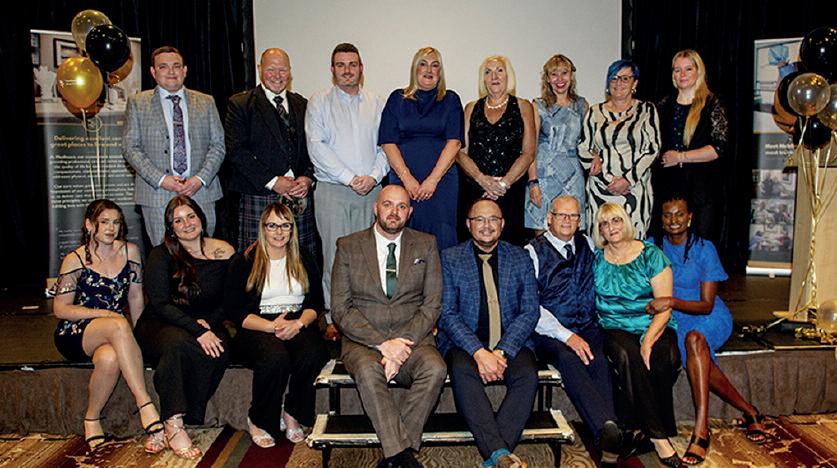
its 13th year, returned to the Dunblane Hydro for the official ceremony with 200 people in attendance from Meallmore’s 26 care homes across Scotland Presented by singer and TV personality Michelle McManus the awards celebrate Meallmore colleagues who have made a positive impact on improving the lives of colleagues, residents, and their family members over the past twelve months Cillian Hennessey, CEO of Meallmore, said: “We have an amazing team across Scotland Our colleagues work tirelessly to deliver high standards of care across all our services always going the extra mile for our residents and their families I’m immensely proud of the care professionalism and collaborative approach that is clear to see in each of our homes up and down the country
Our annual awards are a perfect opportunity to acknowledge the incredible work being done on a daily basis; recognising the difference each and every one of our Meallmore colleagues makes to the lives of our residents The fact that we received so many nominations this year is testament to that “All our finalists have demonstrated remarkable dedication and compassion, and the winners are thoroughly well-deserved It was incredibly hard to judge! A big thanks also goes to our supplier support as well as the fantastic Michelle McManus who, once again, has supported us at the awards, shining a light
on the care we offer throughout the country
On presenting the awards, Michelle McManus added: “I was honoured to be asked to take part in the Meallmore Colleague Awards again this year It s always such a positive event with some truly worthy winners I love hearing the stories behind the nominations as it s clear that the team are dedicated passionate and really care about the residents and their families
“Thank you to all at Meallmore for inviting me back to be part of this special occasion and a huge congratulations to all who were nominated You’re all winners in my eyes!” AWARD WINNERS INCLUDE:
Emerging Talent – Howard Skeet Hilton Court
Home Support Colleague – Tia David, Willow Lodge
Positive Impact – Cameron Hunter Redwoods
Manager Of the Year – Julie-Anne Thomson, St Modans
Senior Care Worker/Practitioner of the Year – Michelle Millar Greenan Manor
Head Office and Field Based Support Team – Piotr Weiland L & D Team
Meaningful Activities – Samantha Trainor Manor- Grigor House
Specialist Service of the Year – Hilton Court
Elderly Home of the Year – St Modans
Nurse of the Year – Michelle King Kincaid House
Carer of the Year – Steven Carruth, Alderwood
Brand Ambassador – Jody Marshall Hospitality Team
Meals Mean More (Competition) – Dan McGonigle Kincaid House
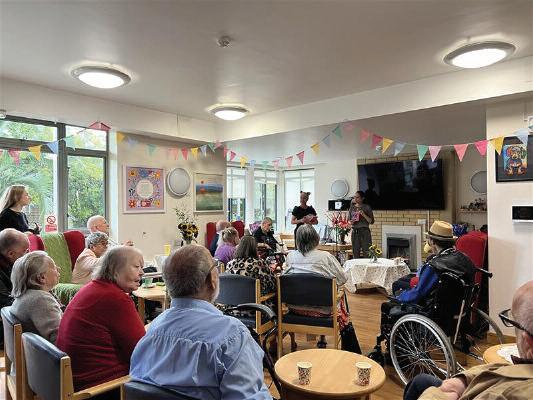

care providers clients and their families gathered to celebrate the exceptional accomplishments in delivering outstanding care across the region Held at Milsoms in Kesgrave this prestigious event marked a significant milestone in recognising and applauding the dedication and commitment of the Suffolk care sector
This year with Angela at the helm the event resonated with a sense of unity and purpose as attendees celebrated the individuals and organisations who make a profound impact on the lives of those they serve
Christian Bone Chief Executive of Care Development East said:
“We were delighted to have Angela Rippon, a dedicated advocate for social care and co-chair of The Prime Minister s Champion Group on Dementia Friendly Communities, presenting this year’s awards
The judges had a tough job with so many inspiring nominations especially after a challenging few years for social care It was uplifting to celebrate the incredible talent in our sector and we congratulate all the winners and finalists for their outstanding contributions

“The care sector plays a vital role in community wellbeing, and these awards provide a great opportunity to recognise those efforts We are also grateful to our sponsors for their invaluable support in making this event possible ” Angela Rippon CBE the host of the evening remarked It was an immense privilege to be part of the eighth annual Suffolk Care Awards As someone who actively supports dementia care through my work with Dementia Friendly Communities and as an Ambassador for the Alzheimer’s Society I understand just how crucial this sector is
“The incredible dedication of every individual in the social care field plays a vital role in improving the lives of others I d like to extend my congratulations to all the finalists and winners of the evening It was a remarkable event, and I was delighted to be a part of it!”
The Suffolk Care Awards 2024 featured ten prestigious award categories each celebrating excellence and innovation in care We are thrilled to announce the deserving winners
Equality Diversity and Inclusion - Merryfields Care Home
• Ambassador of the Year - Shaun Draper from Cephas Care
Environmental Innovation - Avocet Court
Health and Wellbeing - Merryfields Care Home
End of Life Care - Cedrus House
Developing Young People Award – Mia Kendry and Toni Woods
Inspirational Leadership – Amanda Jackson from Beccles Care Home
Professional Development – Joanna McCall from Home Instead and Antony Link from Merryfields Care Home
Small Team of the Year – Ocala Healthcare
• Large Team of the Year – Haverhill Community care
An additional award the Lifetime
lives at Colten Care s Avon Reach home in Mudeford Dorset had a ‘wish come true’ at a private lesson in the Mad4Dance school in Christchurch with Principal Julie Laming
The experience was arranged by the Companionship Team at Avon Reach after they learned Erika, a former fashion model born in Germany in 1925 would love to go dancing again
“Vogue by Madonna was perfect as Erika likes to do lots of poses ” said team member Pauline Lawrence “In the days leading up to the lesson we discussed what dress she should wear
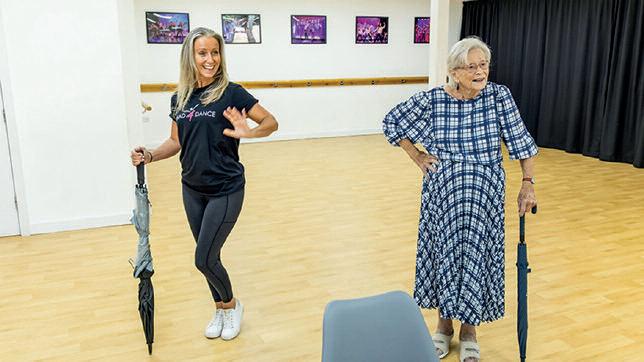
“She was undecided at first but then chose one that was just right She also enjoyed selecting her jewellery and making sure she would feel comfortable in her shoes
“As we prepared, we all shared in Erika’s excitement that what was going to happen would make a wish come true for her She was smiling so much
On the day Erika and Pauline travelled by Colten Care minibus to Mad4Dance where they were greeted by Julie and her team
Four generations of Erika s family were present as lending support were daughter Anna Farr granddaughter Julie Nolan and great granddaughter Sharna Pearce
The minute I saw the dance teacher I felt at ease said Erika As we started I was able to express
myself and feel the freedom of dance I wanted the teacher to see what I could do It was amazing to dance in this way ” Of course it all went too fast but I now have some fantastic memories to cherish
Asked for her advice to young dancers Erika said: “I would always advise young people to have a go and just dance I haven t ever been a professional, I just love music and movement ” Julie Laming said: Erika was so much fun and a complete inspiration to teach and spend time with Enabling her wish to have a private dance lesson using Vogue to come true was a complete honour and pleasure What an amazing lady! “Erika s strong spirit and appreciation of how dance is so good for the soul was a powerful reminder to all of us Thank you Erika!
Reflecting on the day, Pauline said: “Erika is a beautiful lady and it was a privilege to accompany her to Mad4Dance and to see how much the experience meant to her Released in 1990, Vogue became one of Madonna’s biggest hits, selling six million single copies Its accompanying black and white video won Video of the Year at the 1990 MTV Video Music Awards The song fuses fashion glamour club culture house music and techno with echoes of New York s underground gay scene of the 1980s
Upbeat escapist lyrics include lines such as Let your body move to the music Go with the flow ‘Strike a pose, there’s nothing to it’, ‘You re a superstar, yes that’s what you are’ and ‘All you need is your imagination
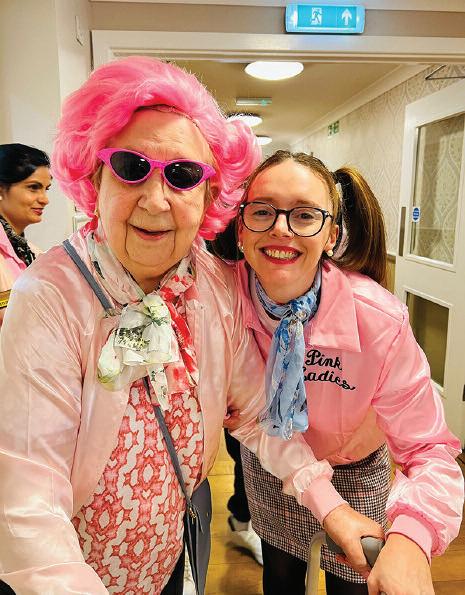
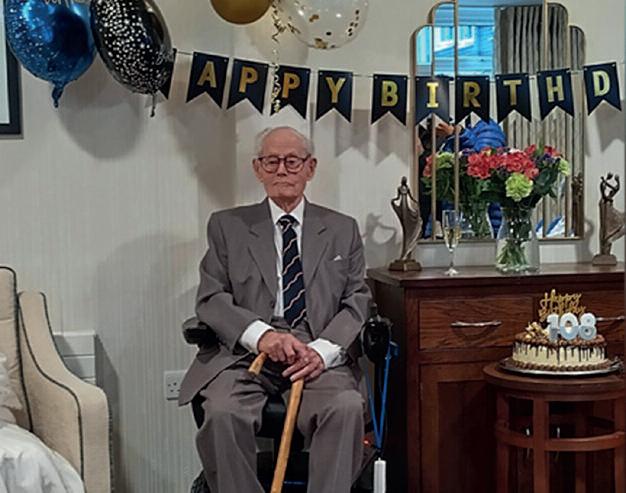

Stile Manor


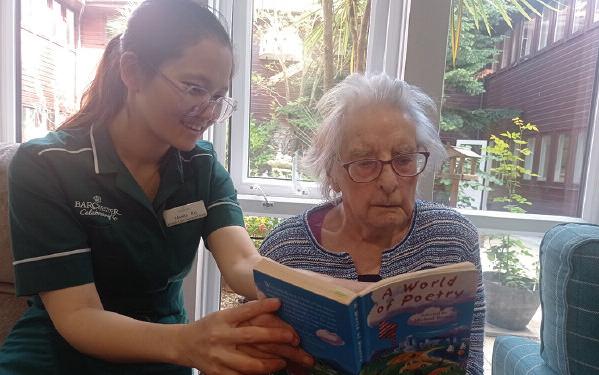
Copperfield Court care home part of Oyster Care Homes has introduced an innovative Hydration Station to promote the health and wellbeing of its residents The new station encourages higher fluid intake helping to reduce the risk of dehydration-related issues and enhance overall care quality at the home The initiative was inspired by Copperfield Court s daily Quality KPI reviews which identified that several residents admitted during the summer months were experiencing urinary tract infections (UTIs) To address this the care home installed the Hydration Station as a proactive measure to encourage regular fluid consumption, helping prevent further risk of infection and supporting residents health
“One of our core values at Oyster Care Homes is quality ” said Eve Balcombe General Manager at Copperfield Court We are committed to maintaining the highest standards of care and services for our residents The Hydration

The Cleaning & Hygiene Suppliers Association has launched a campaign designed to spread the word about the importance of regulations when buying cleaning and hygiene chemicals
Compliance with formal UK Government European Union and industry-standard regulations is essential if buyers are to be certain product claims are legitimate and proven Adherence to regulations guarantee safety They underpin transparency and ensure consistency They support buyers informed decision making by providing a framework for comparison so a buyer really knows if they are getting the product or solution they need They also provide accountability giving buyers a route to recourse if needed In short they underwrite an ethical
approach
Buyers and end users can also turn to regulations to be certain they are not misled by environmental claims in the rush toward sustainable solutions
Lorcan Mekitarian Chair of the Cleaning & Hygiene Suppliers Association said: Buyers and end users need to be able to trust the product and sales and marketing claims They need to be certain of the balance between efficacy and sustainability and they need to make sure they are using the right product for the job in hand They are not chemists however so may be misled by seductive sales and marketing messaging

“Our advice is to talk to your manufacturer and ask for evidence to support their claims This will come in the form of their technical data sheets, third party verifications and certifications and, importantly, proof of regulatory compliance ” Gobble-de-gook or undefined phrases to be wary of include: ‘non-renewable chemicals’ ‘chemical-free’ ‘natural’ ‘five times filtered water’ and ‘non-toxic’ ‘Biodegradable’ is also a confusing term As applied to cleaning products it is defined in current legislation (Detergent Regulation (EC) No 648/2004 and corresponding UK post Brexit legislation)
Something claiming to be organic should be certified by for example the Soil Association Net-zero claims should be based on the international net-zero standard (https://sciencebasedtargets org/net-zero) or another reliable third party verified certification
Every member of the CHSA has signed our rigorous Code of Practice, which demands our members trade ethically Amongst other stipulations it requires members to: conduct business dealings in an open honest fair and proper manner and in accordance with the laws rules and regulations of the UK and EU ensure all public statements made by and on behalf of the Member are decent honest and truthful ensure no false or exaggerated claims are made verbally in literature electronically or in any other way • hold and provide evidence on request for product and service claims particularly with reference to legislation certifications and accreditations
The CHSA Code of Practice also includes the Competition & Market’s Authority’s Green Claims Code Its principles are summarised as: Claims must be truthful and accurate
Claims must be clear and unambiguous
Claims must not omit or hide important relevant information
Comparisons must be fair and meaningful
Claims must consider the full life cycle of the product or service
Claims must be substantiated
Finally every member of the CHSA s Accreditation Scheme for manufacturers of cleaning chemicals has signed the CHSA s own ethical marketing code
@CHSACleaning www CHSA co uk




mk-hire co uk See the advert on page 19

MOWOOT II – proven solution to chronic constipation without medication
Developed by a team of doctors and other healthcare professionals, MOWOOT II performs gentle abdominal massage to speed up intestinal passage in people experiencing chronic constipation
Clinically proven safe and effective relaxing and sideeffects free MOWOOT II
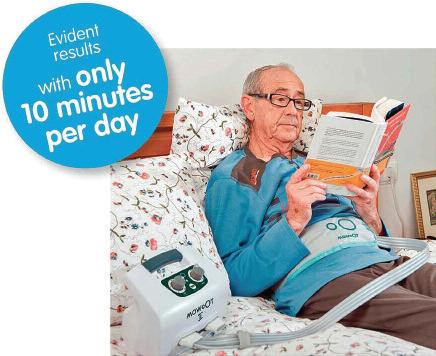
Abdominal Massage Therapy System combats constipation and provides soothing relief to affected people
Easy to use and comfortable the MOWOOT II treats and manages constipation in people with spinal cord injuries multiple sclerosis sufferers Parkinson’s Disease patients and people with constipation related to prescription medication MOWOOT II also helps to relieve idiopathic constipation experienced by menopausal and post-menopausal women

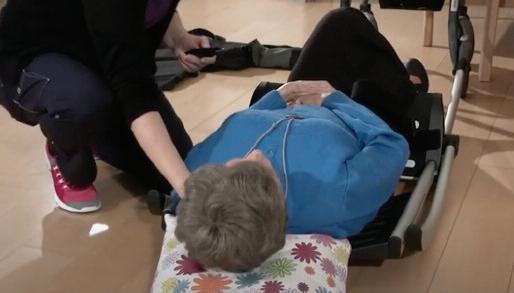
and older and elderly people In clinical studies
MOWOOT II increased evacuation frequency softened stools, improved regularity, reduced gasses relieved bloating and eased off abdominal discomfort 10 to 20 minutes daily of relaxing abdominal massage with MOWOOT II rapidly reduces symptoms of constipation Evident results are experienced only a few days after the first treatment Regular abdominal massage with MOOWOOT II ensures lasting health benefits and better quality of life
MOWOOT II – effective solution to chronic constipation for better quality of life! Supplied



Our Integrity Static Cushions crafted with high-quality materials and innovative design are effective in preventing and managing pressure ulcers by redistributing pressure and minimising skin damage They feature a larger surface area that spreads the user's weight reducing pressure on specific points EasyGo patient lift and transfer chair addresses common issues found in traditional hoists which are often cumbersome and difficult to manoeuvre especially in tight spaces and require multiple staff members EasyGo simplifies the lifting and transferring process enhancing patient dignity and comfort It is designed to move between beds wheelchairs toilets and cars Additionally we have developed a patient transfer seat that can incorporate any Integrity Static Cushion providing optimal pressure relief during transfers

Pressure ulcers are largely preventable with the right approach Our goal is to make your job easier, allowing you to focus on exceptional care and improving residents' quality of life We offer comprehensive product training and support including inperson and online sessions detailed manuals quick-start guides and access to our support team for advice and updates on best practices in pressure ulcer prevention 01457 890 980 | sales@sumed co uk | www sumedinternational com See the advert on the back cover for further information
service

as well as curtains and offers a comprehensive range of shutters
Doug says: “We stock two ranges of silent gliss corded curtain tracks and two ranges of silent gliss uncorded curtain tracks the fitted prices for which are available on this website All of the aluminium silent gliss tracks stock can be shaped and fitted into bay windows, as can some of the poles We also have ready access to many more ranges of both tracks and poles, most of which we can get in one working day “To read more of what our customers say about us please do look us up on Checkatrade checkatrade com/mrtrax
Call now to speak to one of our team on 0800 3345114 or 07968 242004 email us at doug@mrtrax co uk or see the advert on page 8

NCCO International announces the launch of Task Manager an innovative food safety task management and temperature monitoring solution designed for the senior living and residential care home sector Task Manager addresses critical pain points in food safety compliance operational efficiency and resident satisfaction
Task Manager is a game-changer for the senior living industry said Karl Rose Managing Director of NCCO International, "Our system not only ensures compliance with food safety regulations but also enhances the quality of life for residents by guaranteeing safe and nutritious meals
Task Manager assists senior care facilities in adhering to local state, and federal food safety regulations aiming to reduce the risk of foodborne illnesses among elderly residents By providing detailed record-keeping and log management Task Manager supports facilities in maintaining audit readiness facilitating health inspections and compliance checks

Task Manager automates temperature monitoring for refrigerators freezers and food storage areas to help maintain safe limits without manual checks The system organizes food safety-related tasks, such as cleaning schedules equipment maintenance and staff training to help ensure thoroughness With consistent monitoring Task Manager helps maintain the nutritional value and quality of stored and prepared food Real-time alerts for temperature deviations enable quick corrective actions, potentially preventing spoilage and ensuring residents receive high-quality meals For more information about Task Manager please visit www ncco eu or contact David Webster at dwebster@ncco com

By
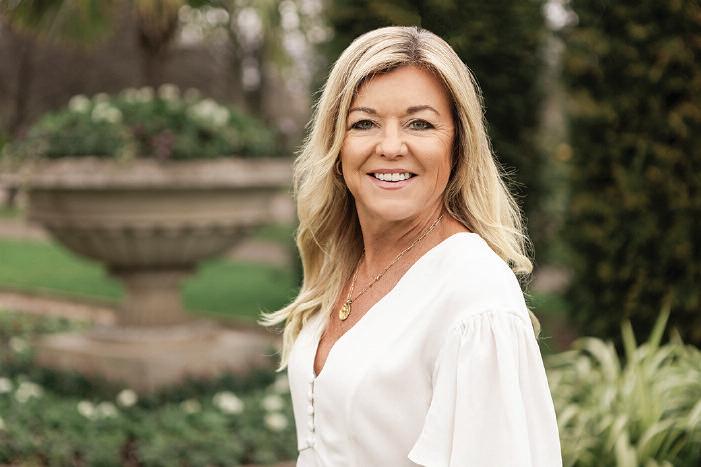
Malnutrition remains a significant issue in care homes where the elderly are particularly vulnerable As a registered dietitian working in the community and in hospital wards often with elderly people who have experienced fall, I wish more people knew about the prevalence of malnutrition and how to combat it before they ended up in hospital
Recent statistics paint a stark picture: Around one in 10 people over the age of 65 are malnourished or at risk of malnutrition and this figure rises alarmingly to 45% among those in their 90s According to the British Association for Parenteral and Enteral Nutrition (BAPEN) malnutrition costs the UK approximately £23 5 billion annually with older adults being disproportionately affected
As the population ages addressing malnutrition and its associated complications, such as frailty and sarcopenia, becomes ever more critical By focusing on early detection and strategic nutritional interventions, including the use of protein, care homes can play a vital role in safeguarding the health of their residents
SPOTTING THE EARLY SIGNS OF MALNUTRITION
The first step in combating malnutrition is recognizing its early signs
The Malnutrition Universal Screening Tool (MUST) is a valuable resource for this purpose enabling caregivers to systematically assess the risk of malnutrition in residents by considering factors such as Body Mass Index (BMI) unintentional weight loss and the impact of acute illness on nutritional intake
KEY EARLY SIGNS TO MONITOR:
1 Unintentional Weight Loss: A significant early indicator of malnutrition is unintentional weight loss Regularly monitoring residents' weight and comparing it to previous measurements is essential A loss of even 5% of body weight over a few months can signal malnutrition and warrants immediate attention
2 Decreased Appetite: A reduced appetite is often a precursor to malnutrition Residents may skip meals, eat smaller portions, or show a lack of interest in food It s important to understand the reasons behind these changes which could be linked to dental issues depression or medication side effects
3 Physical Changes: Signs such as muscle wasting thinning hair dry skin or dental problems may indicate nutritional deficiencies These physical symptoms are often subtle but crucial indicators of potential malnutrition
4 Fatigue and Weakness: Increased tiredness or difficulty performing daily activities can be related to inadequate nutrition This could also signal the onset of sarcopenia where the loss of muscle mass and strength makes everyday tasks increasingly challenging THE ROLE OF NUTRITION IN PREVENTING AND MANAGING FRAILTY
Frailty a condition characterized by decreased strength endurance and physiological function is closely linked to malnutrition and is a major concern in care homes Proper nutrition is key to preventing and managing frailty particularly through the adequate intake of protein which is essential for maintaining muscle mass and function STRATEGIES FOR NUTRITIONAL INTERVENTIONS:
1 Prioritize Whole Foods: Ensuring a diet rich in whole foods is foundational Protein-rich foods like eggs lean meats, fish, dairy products, and legumes should be emphasized as they not only support muscle
health but also provide essential vitamins and minerals that contribute to overall well-being
2 Incorporate Protein Supplements When Necessary: In cases where residents struggle to meet their protein needs through diet alone perhaps due to a lack of appetite or difficulty chewing protein powders or fortified drinks can be effective These supplements can be easily added to meals snacks or beverages ensuring that residents receive the protein they need without overwhelming them with large portions of food
3 Distribute Protein Throughout the Day: Research shows that distributing protein intake evenly across all meals is more effective for muscle protein synthesis than consuming large amounts at a single meal Caregivers should ensure that residents receive adequate protein at breakfast lunch and dinner to maximize the benefits for muscle maintenance and frailty prevention
ADDRESSING BARRIERS TO ADEQUATE NUTRITION
While boosting protein intake is essential we should also address the barriers that may prevent residents from consuming enough nutrients Factors such as taste preferences difficulties with swallowing, or digestive issues can all impact nutritional intake Caregivers should work closely with dietitians to develop personalized nutrition plans that accommodate these challenges potentially incorporating protein powders and other supplements in palatable and easy-to-digest forms NUTRITION IS KEY TO INCREASING HEALTHSPAN
Malnutrition in care homes is a pressing issue that requires vigilant monitoring and proactive management While the numbers alone tell us the stakes are high intervention is more than about reducing costs The ability to stand up from a chair unaided allows our elderly residents independence By spotting the early signs of malnutrition and implementing strategic nutritional interventions, caregivers can help prevent and manage frailty significantly improving the quality of life for residents By addressing malnutrition and frailty head-on care homes can help residents not only avoid the adverse effects of these conditions but also thrive in their later years

WHAT IS DYSPHAGIA?
Dysphagia is a medical condition that makes swallowing food and drink more difficult Depending on the severity some textures may be more difficult to swallow or somebody may have lost the ability to swallow at all Regardless this can make mealtimes much more difficult, which is why care home caterers must know about this condition and how to support those who have it
A few conditions can cause dysphagia including cancer head injuries a stroke or dementia Age can also play a role in developing this condition meaning there could be a higher likelihood of some residents suffering from this EFFECTS OF DYSPHAGIA
Dysphagia doesn’t just affect mealtimes – it can also: Impact on quality of life: If somebody is no longer able to eat and drink as they ve been able to they may become withdrawn and develop a low mood The change can be difficult to get to grips with which is why supporting residents through their dietary transition and making sure they’re properly catered for is so important
Lead to malnutrition and dehydration: A lack of food and drink due to not being able to swallow or chew properly can mean that residents aren’t properly hydrated or receiving enough nutrition This can result in lower energy levels and in more extreme cases can also lead to further health complications
• Cause choking: Without specialist catering somebody with dysphagia may not be able to swallow their food which can be a choking hazard
FRAMEWORK?
By Rob Henry,
Head of Culinary Solutions and Compliance at EF Group (www ef- group co uk)
dysphagia who have trouble chewing and swallowing Using this framework caterers in the care industry can determine which foods and drinks would be easiest for people with this condition to consume IDDSI consists of eight levels ranging from 0 to 7 with drinks ranging from 0 (thin) to 4 (extremely thick) and foods ranging from 3 (liquidised) to 7 (regular and easy to chew) These indicate the texture and thickness of foods and drinks and give some steer as to which ones would be safest for somebody with dysphagia to consume
ADDITIONAL CONSIDERATIONS FOR CATERING TO
DYSPHAGIA
When you’re preparing to cater for residents with dysphagia there are a few extra things you might need to consider These include:
Training your staff on the IDDSI framework: Ensuring your staff understand the framework what it means and how to apply it is crucial Holding training sessions on this can make sure everybody is on the same page when it comes to catering to the needs of residents with dysphagia
Knowing when to modify the menu to resident needs: Once your team are trained on the IDDSI framework, this must be implemented into your catering practices This should involve assessing each resident’s dietary needs to see if they require modifications and monitoring this over time in case further changes are needed
Getting in the correct nutrients and fluids Alongside modifying diets based on what is easiest for residents to consume you should be ensuring all residents are properly hydrated and receiving a balanced and nutritious diet Whether their food is liquidised, regular or somewhere in between hydration and nutrition must never be reduced even though you might need to alter the way these are offered to residents
Making mealtimes more enjoyable: If somebody has been living with dysphagia without a modified diet they may need some extra encouragement at mealtimes once the modifications have been made Try making mealtimes social introducing different flavours or recipes and regularly rotating menu options to keep them interested and more likely to finish their food
Supporting residents with dysphagia is a key duty of caterers in the care industry and can have a huge impact on their wellbeing, health and quality of life Therefore, it’s vital that your catering team are aware of the signs of the condition and how the IDDSI framework can be used to prescribe a better approach to their mealtimes
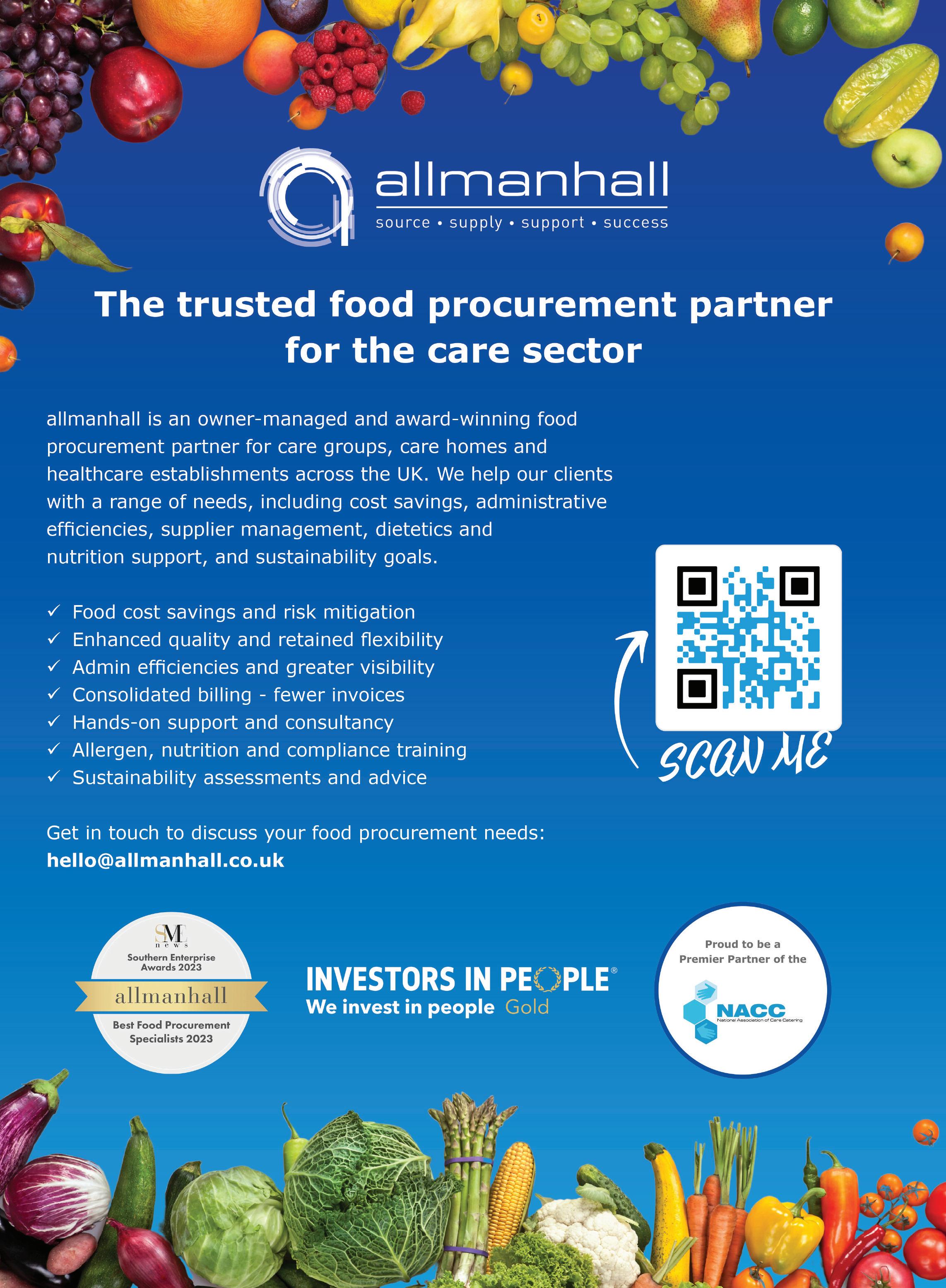
Food procurement specialists allmanhall, explore the importance of nutrition and hydration in older people specifically considered for a dignified and person-centric dining experience
Proper nutrition and hydration are critical in care homes directly impacting the health wellbeing and overall quality of life for residents Research by BAPEN reveals that malnutrition affects 35% of care home residents in the UK leading to a variety of health issues including increased infections, poor wound healing mental health decline social isolation and increased frailty This underlines the need for a comprehensive person-centric approach to food and drink in these environments
As people age the risks of malnutrition and dehydration increase compounded by the natural decline in thirst reflex and in some cases cognitive impairments such as dementia These factors make it challenging for older individuals to maintain adequate nutrition and hydration Therefore it s crucial that care home staff adopt a dignified approach to meals, recognising that the involvement in making choices about food remains important even when other capacities are diminished

At a recent National Association of Care Catering (NACC) Seminar care professionals emphasised the significance of creating a positive mealtime experience Engaging residents in conversations about their food preferences understanding their personal histories and ensuring that texture-modified meals are both nutritious and appealing are vital steps in enhancing mealtime satisfaction
Hydration is equally important playing a key role in bodily functions and the prevention of conditions like urinary tract infections and chronic renal disease Strategies to encourage fluid intake include offering a
Our
A belief in the universal right to high-quality delicious nutrition drives us to keep creating and to keep finding ways of helping more people eat real food – regardless of their age lifestyle or health Flavour Creations and Albany Products are pleased to introduce Screamies No-Melt Ice-Scream to the UK dysphagia market
variety of beverages, promoting "hydration hour" with mocktails, and providing high-fluid-content foods like soups and yogurts It s also important to educate care home staff on recognising signs of dehydration which can manifest as tiredness headaches and poor concentration
Nutritionally care homes should focus on nutrient-dense foods rather than calorie-dense ones Incorporating ingredients like eggs seeds, and Greek yogurt can help ensure that residents receive essential nutrients Additionally increasing dietary fibre through foods like whole grains, legumes, and unpeeled fruits can support digestive health and reduce the risk of conditions such as diabetes and heart disease It's important however to introduce fibre gradually to avoid digestive discomfort
For residents with dysphagia a condition that impairs swallowing care homes must offer texture-modified diets that are both safe and nutritious Providing adequate training for staff on preparing these meals, ensuring that they are nutritionally fortified, and enhancing flavours with herbs and spices can make these meals more enjoyable for residents
In conclusion providing a holistic person-centric dining experience in care homes is essential for maintaining the health and dignity of residents By focusing on nutrition hydration and individual preferences care homes can significantly enhance the quality of life for their residents
The mealtime experience is so much more than just food Care establishments across the UK are partnering with allmanhall to manage their food procurement achieve savings and improvements and to access support to enhance the overall dining experience Get in touch – hello@allmanhall co uk
Launched in 2016 SCREAMIES is a brand with one purpose: to deliver the taste of sumptuous old-fashioned ice cream and make it accessible to everyone Each SCREAMIES product is created with a specialised no-melt formula resulting in shelf-stable ice cream products that can be enjoyed by everyone SCREAMIES ice-scream also never gets softer than IDDSI Level 4 making it the perfect treat for those with dysphagia

As well as the traditional three flavours Screamies offers Chocolate and Salted Caramel with added Protein for those with additional nutritional needs With a long shelf life Screamies can be stored at ambient temperature and frozen when the time suits Flavour Creations also offer a wide range of market leading supporting products for those looking to provide something extra to patients Pre-thickened Ready to Drink ranges include in excess of 20 flavour profiles Advital nutritionally complete powder comes flavoured and neutral and is used in snacks like Advital chocolate mousse and Fruits with Attitude Flavour Creations also supply high quality moulds and Shape It to assist with food preparation at all IDDSI levels
To find out more simply contact Albany Products at enquiries@albanyproducts co uk or call on 01706


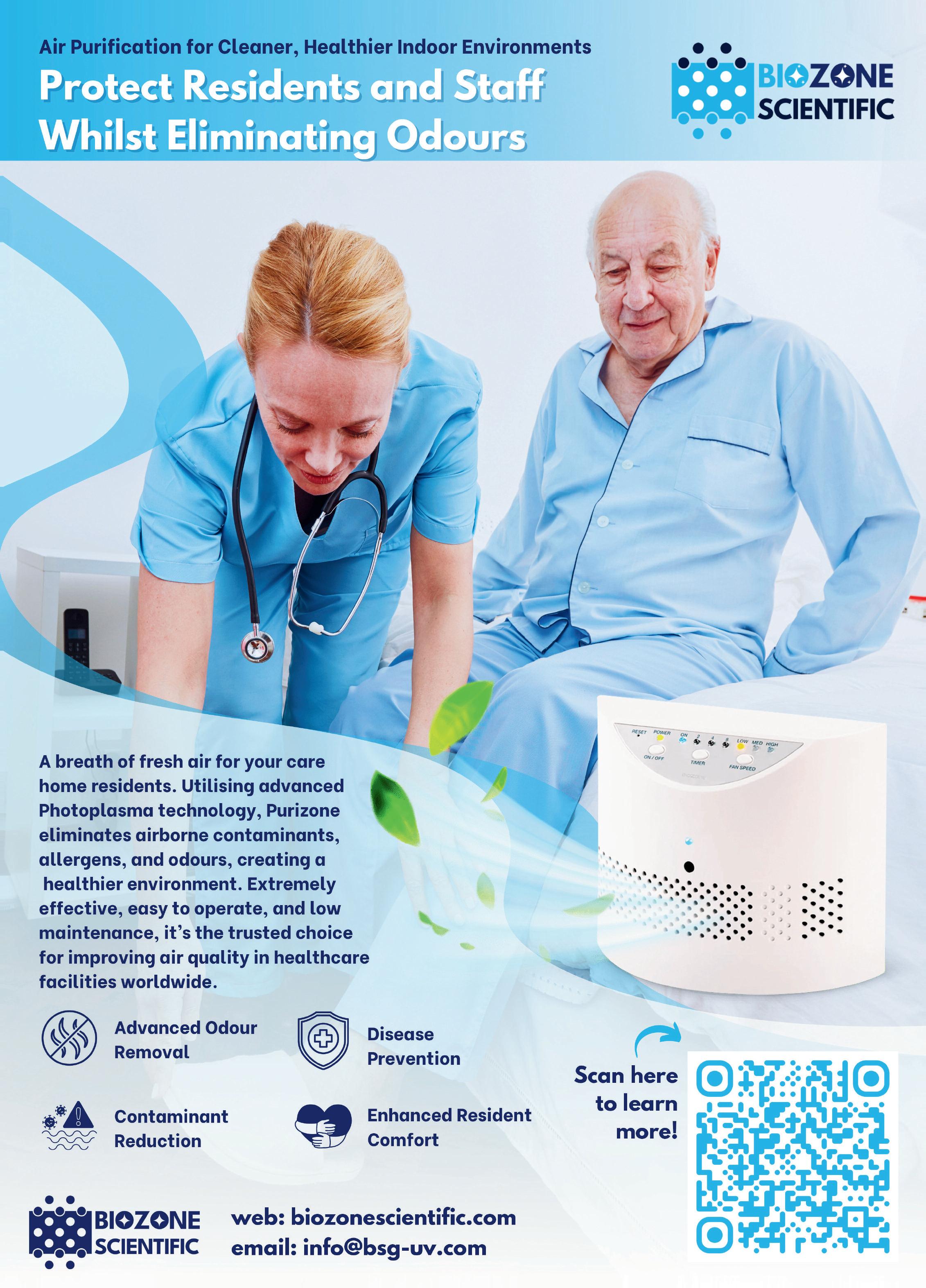



Oxy-Gen
This
Oxy-Gen
All
Carbon
With
See






When




By Scott Williamson, Managing Director,

In the ever-changing and often demanding environment of residential and nursing care homes prioritising the well-being of residents is paramount As care providers it is imperative to explore innovative methods to enhance the quality of life for those in care especially individuals living with cognitive impairments such as dementia One highly impactful method embraced in recent years is sensory stimulation a comprehensive approach that enhances physical, emotional, and cognitive well-being With the integration of advanced AI technology, newer technologies such as personalised, relaxing music videos breathe new life into old black-and-white photos by colourising them accompanied by soothing music captivating landscape visuals and cherished family photos or video messages This provides a distinctive way to deliver a holistic, sensory-enriched experience that significantly benefits elderly residents and those with dementia
DIVERSE FORMS OF SENSORY EXPERIENCES
There are many ways to incorporate sensory experiences into daily care each offering unique benefits for residents
1 Visual Stimulation: Personalised relaxing music videos use serene natural landscapes and family memories to captivate residents' visual senses These familiar images, paired with scenic backdrops evoke positive emotions and comfort Advanced technologies such as AI-powered colourisation of old black-and-white photos bring memories of the past to life enriching the experience further by reconnecting residents with their personal history
2 Auditory Stimulation: The choice of music in these videos is key Rather than familiar music that may evoke specific emotions or memories soothing and non-intrusive sounds are purposefully chosen to enhance deep relaxation and open the senses to help immerse themselves in the visuals and relax without the distraction of nostalgia, allowing for a more profound sensory experience
3 Tactile Stimulation: Personalised videos can be paired with tactile activities to further engage residents Watching these calming visuals while interacting with textured objects fidget blankets or engaging in simple activities like handling soft fabrics can provide enhanced comfort and sensory richness
4 Olfactory Stimulation: While videos alone do not engage the sense of smell pairing them with aromatherapy sessions using calming scents like lavender or invigorating fragrances like citrus can amplify the relaxation experience making it more immersive and holistic
5 Gustatory Stimulation: Taste experiences can also complement sensory videos For example, while watching
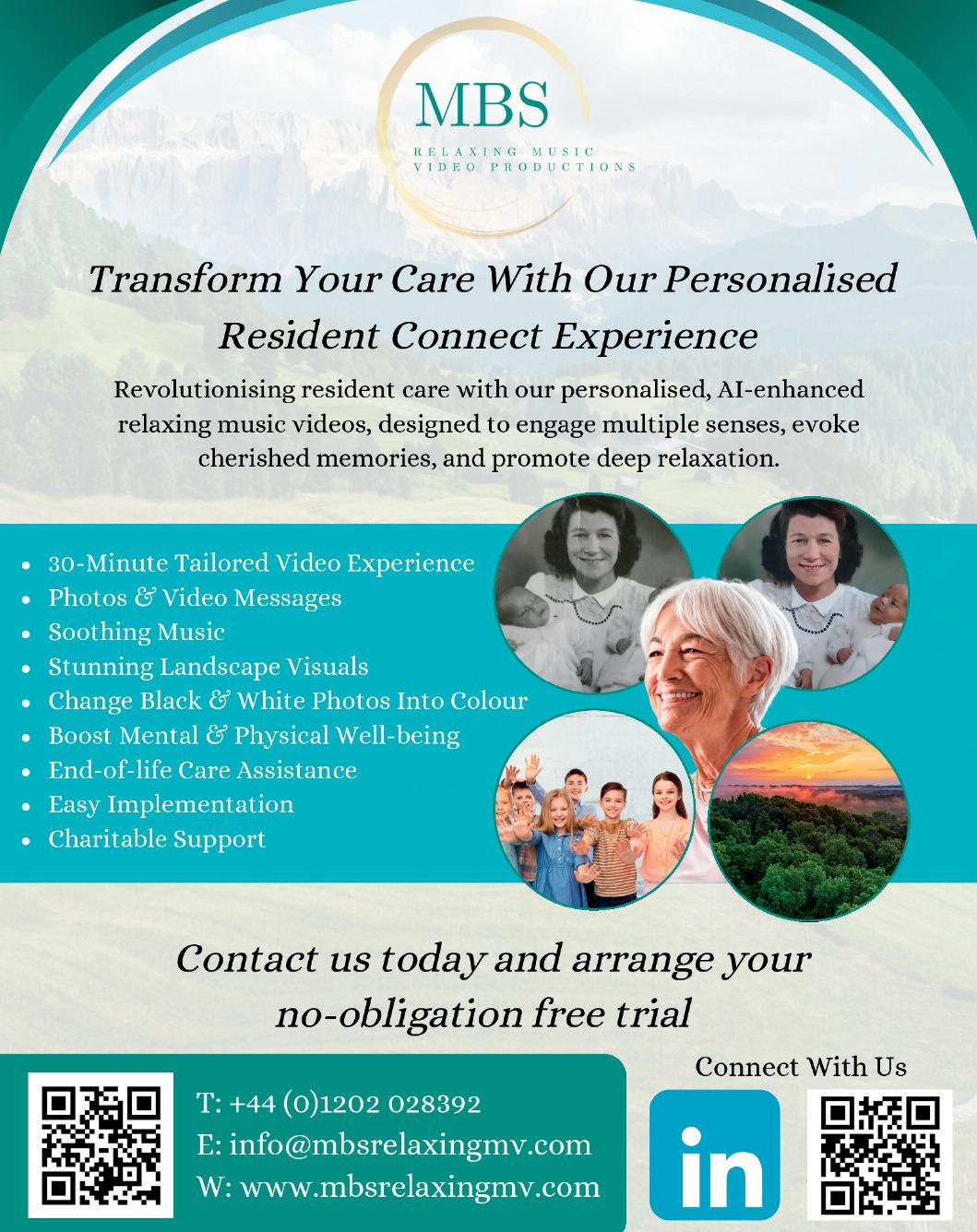
THE
personalised landscapes or family-themed videos, residents can engage in taste sessions, trying familiar and comforting flavours adding another dimension to the sensory experience
The implementation of sensory stimulation has wide-reaching benefits that can positively impact residents' emotional, psychological, and physical health Regular sensory activities offer the following advantages:
- Reduction in Agitation and Restlessness: Especially for residents with dementia, these videos create a sense of familiarity and calm reducing anxiety and behavioural issues
- Improved Cognitive Function: Engaging residents’ brains through visual and auditory stimuli helps maintain and in some cases improve cognitive abilities providing meaningful engagement
- Enhanced Communication: Residents who struggle with verbal communication often respond emotionally or cognitively to visual and auditory cues Personalised videos offer alternative ways for residents to express themselves facilitating greater interaction
- Increased Social Interaction: When shared in group settings, these videos encourage social engagement, helping reduce feelings of isolation and loneliness
SENSORY STIMULATION FOR DEMENTIA PATIENTS
For dementia patients sensory stimulation plays a particularly important role in their care Personalised videos offer structure, evoke memories, and facilitate moments of connection between residents and caregivers or family members Combining these videos with other sensory activities such as memory boxes filled with personal items can deepen the experience, triggering memories and meaningful conversation
CREATING SENSORY ROOMS IN CARE HOMES
Many care homes have found success in creating dedicated sensory rooms Personalised relaxing music videos are ideal for use in these spaces where they can be combined with soft lighting calming scents and tactile objects to offer a fully immersive environment These sensory rooms provide a tranquil retreat for residents allowing them to engage multiple senses in a way that is soothing and beneficial
THE POWER OF VISUAL LANDSCAPES FOR SENSORY STIMULATION
Visual landscapes such as nature scenes are an invaluable tool for sensory stimulation For residents who may no longer be able to experience the outdoors firsthand, these videos offer a powerful connection to the natural world Scenes of oceans forests or mountain views have been shown to reduce anxiety alleviate stress and promote mental well-being The immersive quality of these visuals when combined with soothing music provides a window to the outside world offering comfort and emotional enrichment for residents who may feel disconnected from nature
AI TRANSFORMING RESIDENT CARE
The integration of AI into sensory stimulation is revolutionising how care homes approach resident wellbeing AI technologies such as the colourisation of old photographs help residents reconnect with their past in vivid detail These enhanced visuals combined with calming music and personal video messages from loved ones create a multi-sensory experience that reduces anxiety and promotes emotional well-being This innovative use of AI not only improves the sensory experience but also strengthens cognitive function making it an essential tool in modern care homes
THE VALUE OF PHOTOS AND VIDEO MESSAGES FROM LOVED ONES
Incorporating photos and video messages from loved ones adds an emotional layer to sensory stimulation Seeing familiar faces and hearing the voices of family members triggers emotional recognition which can provide comfort and reduce anxiety especially for those experiencing memory loss This personalised approach creates meaningful connections stimulating both visual and auditory pathways and offering moments of joy and clarity for residents
Moreover video messages combat feelings of loneliness and isolation Residents feel a stronger sense of belonging and connection to their loved ones, even if they cannot be physically present This can significantly enhance their overall well-being contributing to a more enriching care environment
SENSORY
Sensory therapy particularly 30-minute video experiences serves as a versatile tool for structured activities With the ability to loop the videos for longer experiences caregivers can find moments of respite while enhancing the well-being of residents Creating a calm and engaged environment through sensory videos can improve the caregiving experience and reduce caregiver burnout
CONCLUSION
The integration of sensory stimulation, particularly through personalised AI-enhanced relaxing music videos offers a transformative approach to improving the well-being of residents in care homes By engaging multiple senses including visual, auditory, tactile, olfactory, and even gustatory, these videos provide a holistic and enriching experience that benefits both residents and caregivers For individuals living with cognitive impairments like dementia these sensory experiences evoke memories reduce anxiety and foster emotional connections
The use of advanced AI technologies such as the colourisation of old photos combined with serene landscapes, soothing music, and messages from loved ones, adds a deeply personal and meaningful dimension to the care environment The implementation of sensory rooms and dedicated sensory activities not only enhances residents' physical and emotional health but also offers caregivers a valuable tool for creating a calm structured environment As care homes continue to evolve embracing sensory therapies will remain essential in promoting a higher quality of life for elderly residents and those living with dementia



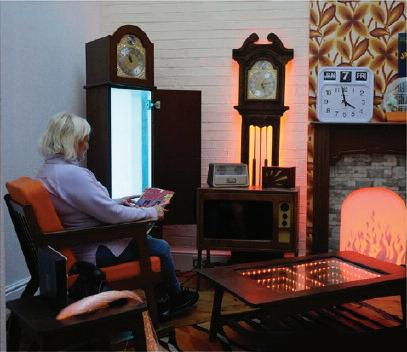

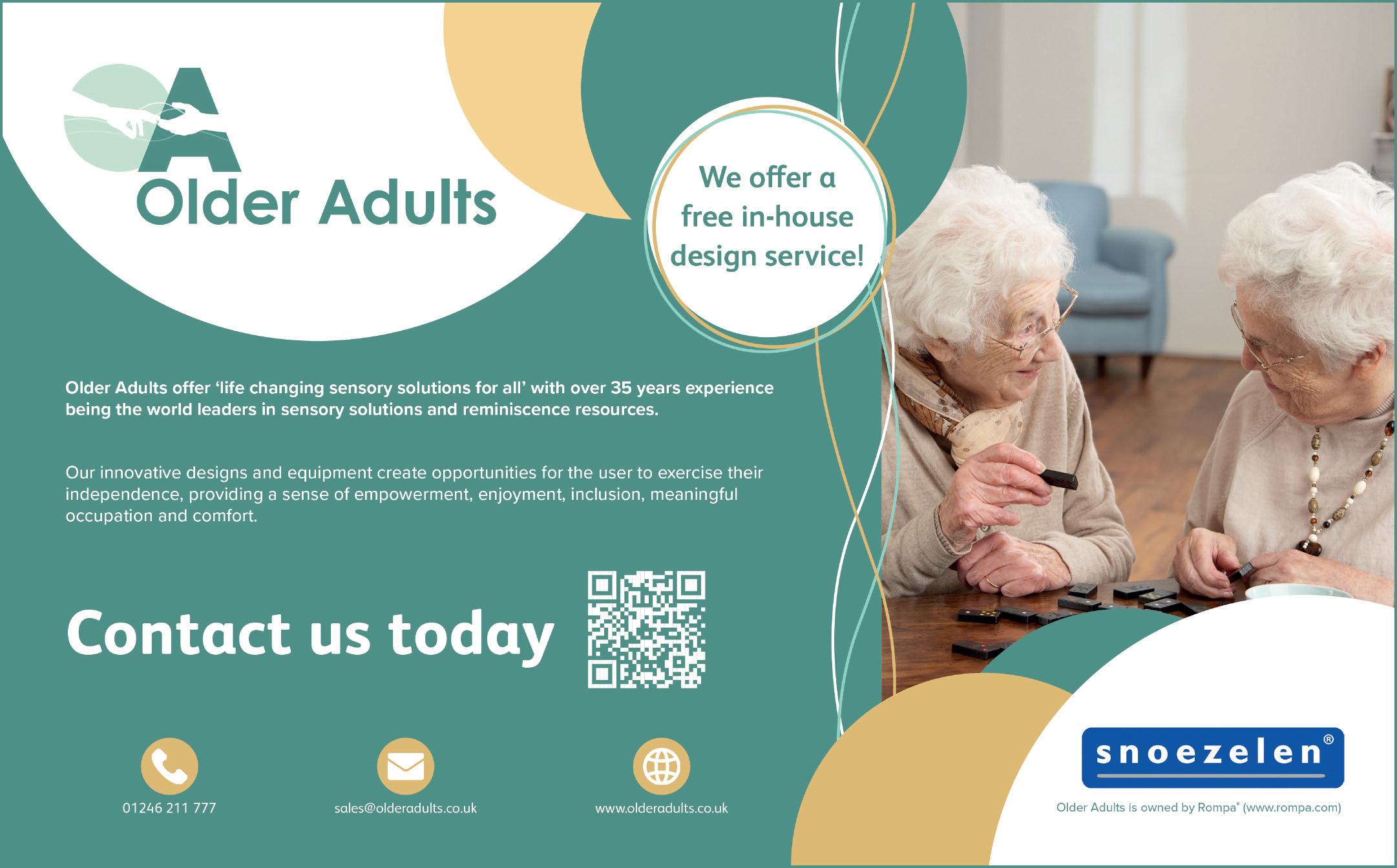

Increase
Improve
Deliver

PASS
Visibility of allergies vaccinations and medications especially useful for clients unable to reliably share their personal information
• Using medical information to inform care planning
Ensuring that the right medication is delivered to the right person in the timeliest manner In one case this allowed the administration of antibiotics on a Friday evening aiding the service user’s swift recovery from infection
Available to all PASS users at no additional cost PASS GP Connect is significantly more efficient than waiting for a GP response It’s also a positive step forward on the path to the DHSC s goal for widespread digitally enabled care and is in full alignment with their ambition for joined up care for everyone
Get in touch: www everylifetechnologies com hello@everylifetechnologies com
The job of a care worker though immensely rewarding is not without its challenges A growing demand for social care has seen carers placed under greater strain, with a mounting workload and limited resources
Increasingly, carers are also exposed to abusive and even violent behaviour from service users and their relatives Be it deliberate or as often the case unintentional Such aggression can leave a profound mark on diligent and dedicated care staff

The solution to many a modern-day problem is often tech and so too is this the case when dealing with today s care landscape STAFF ALARM SYSTEMS
Tech has proven to be a friend to the care worker automating administrative tasks, enhancing reporting and, in the case of staff alarm systems protecting them from potential harm What was originally a bell to alert colleagues to the need for assistance has become far more sophisticated The modern safety alarm is discreet can be easily attached – if not part of – the wearer’s uniform It is supremely efficient and designed with the accuracy to pinpoint the exact location of an active call in a ward of over 80 rooms
the press of a button is incredibly empowering Be it calling lunchtime cover on a 1-to-1 patient, or requesting urgent assistance with an abusive resident the alarm offers staff a greater deal of control assurance and resources while at work HOW DOES IT WORK?
With the press of a button carers have immediate access to a team of responders able to assist, provide cover, and - where neededintervene to de-escalate high-risk situations This access instils confidence in staff: confidence that the highest quality of care can be delivered and confidence in their safety in the workplace For overwhelmed care workers the ability to summon help with
In Pinpoint s case an integrated staff safety system ensures full site security When activated a personal staff alarm emits infrared signals to receiver units installed throughout the building These, in turn, send vital information to display units and devices such as pagers and desktops detailing the exact location and type of call – assistance or emergency
Within 85 milliseconds of triggering an alarm colleagues are informed that an incident is taking place and, crucially, exactly where it is in the building (CONTINUED OVERLEAF)
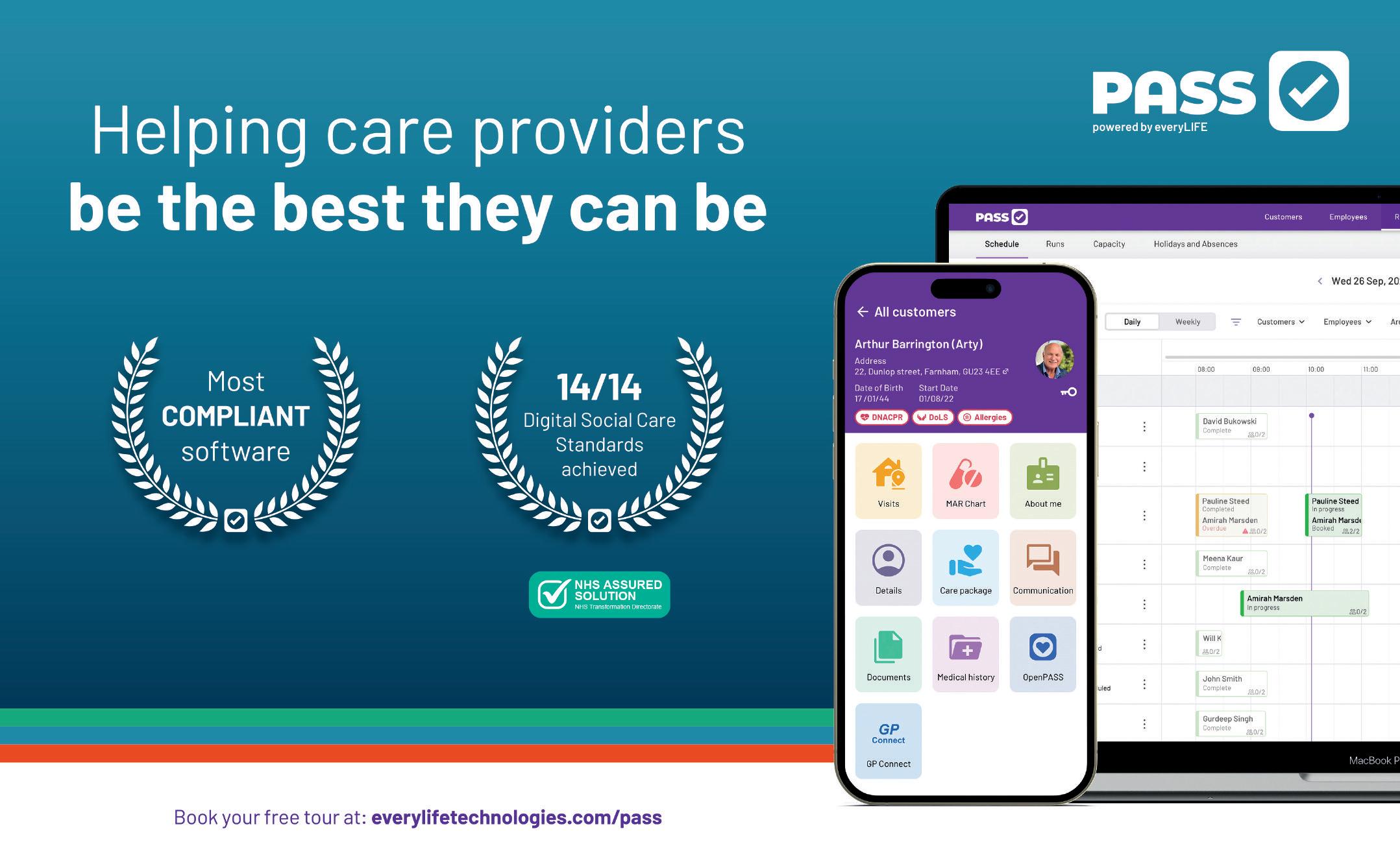
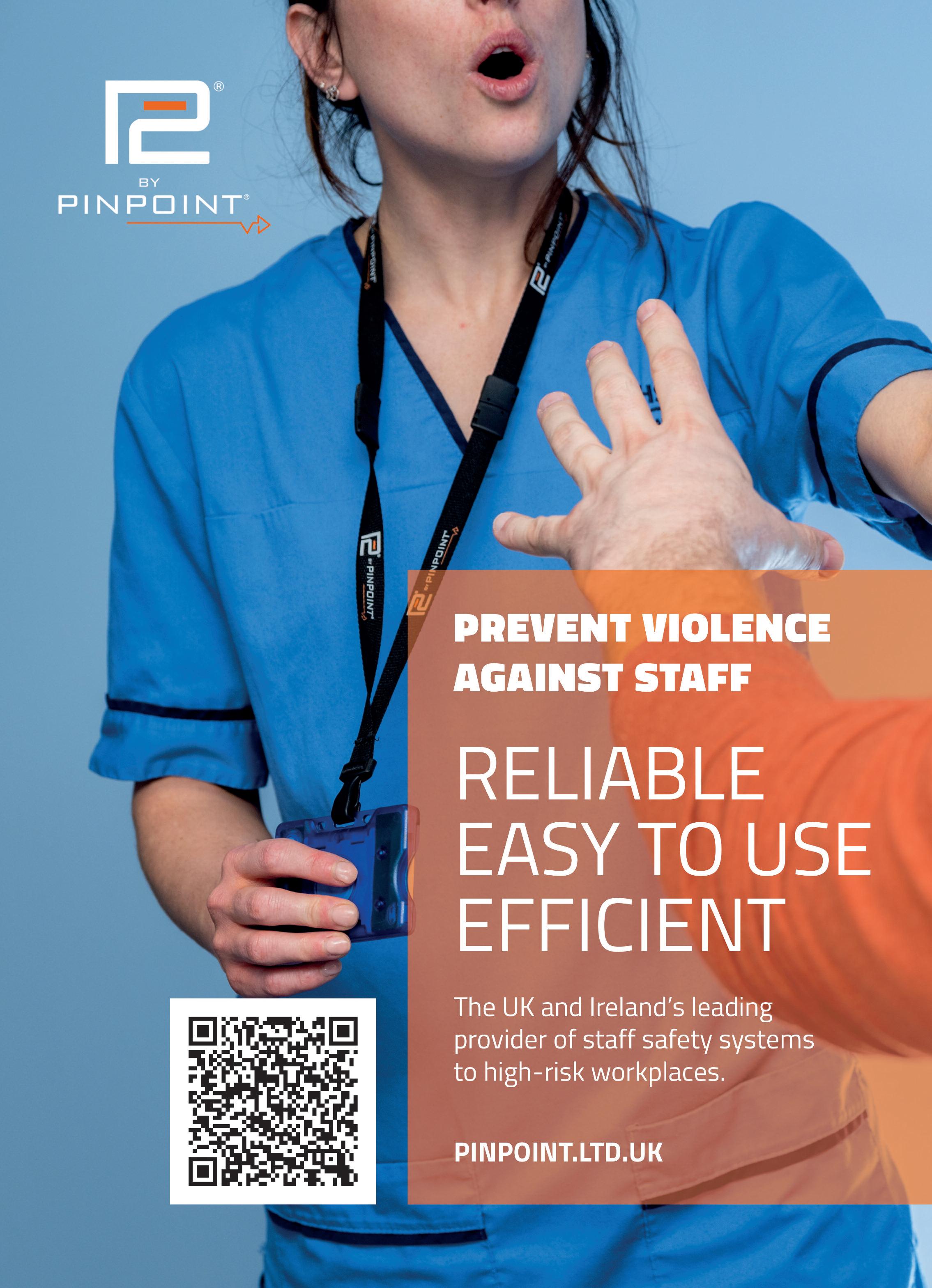




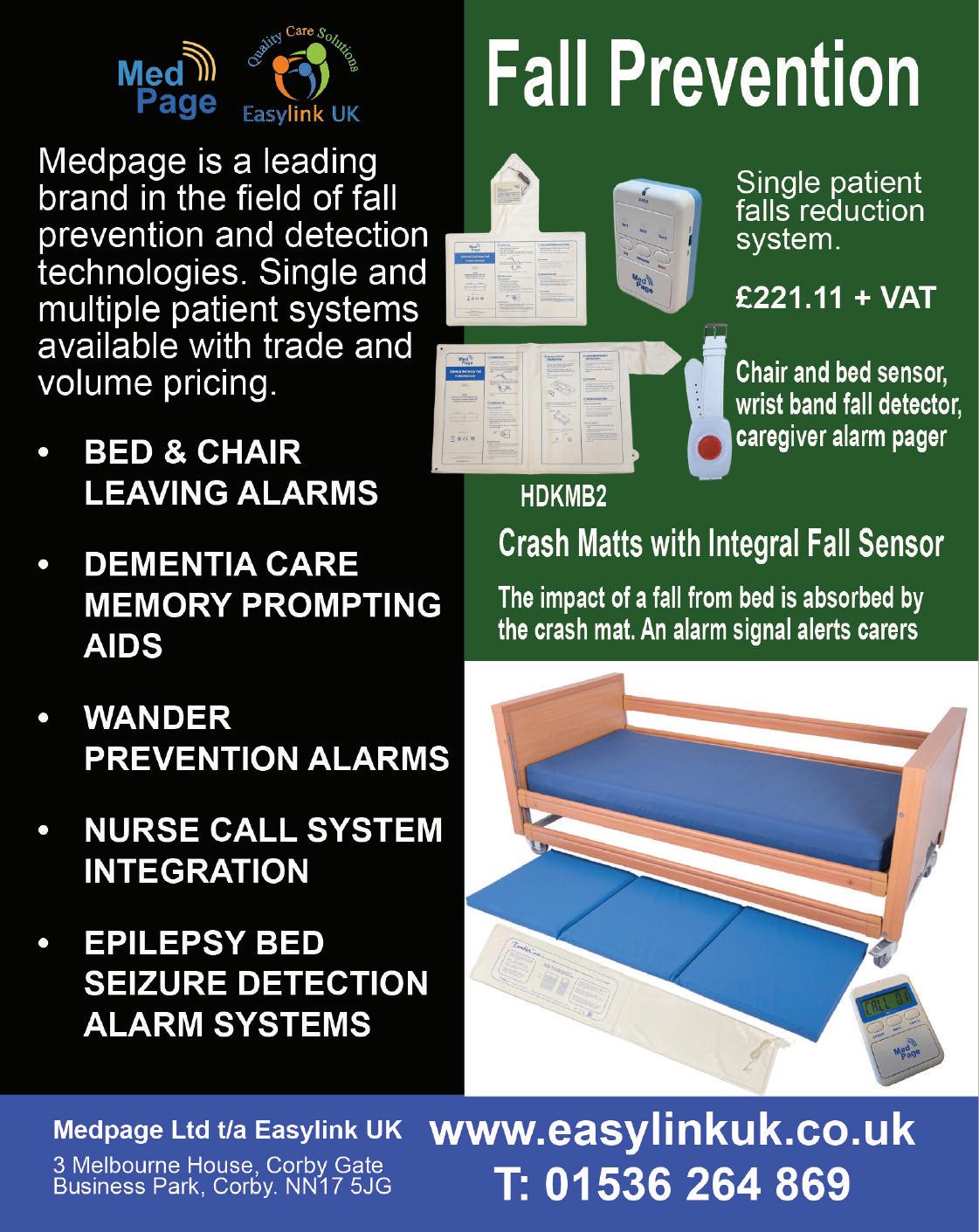
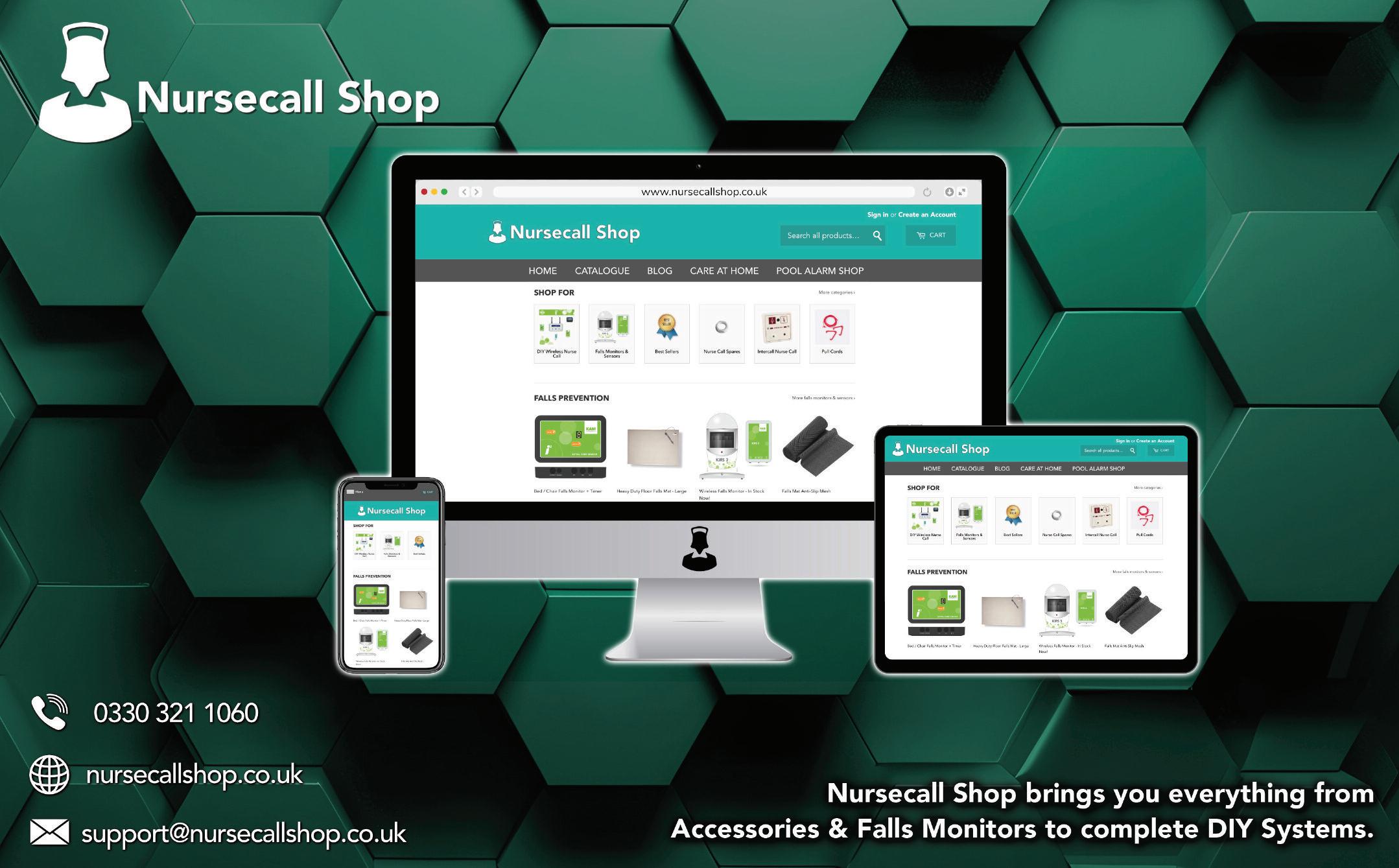
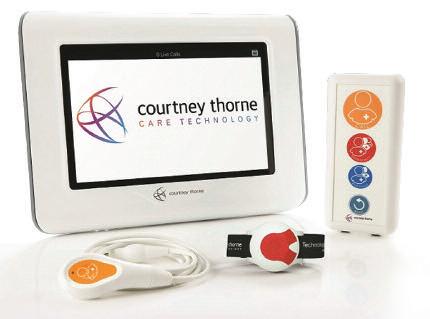


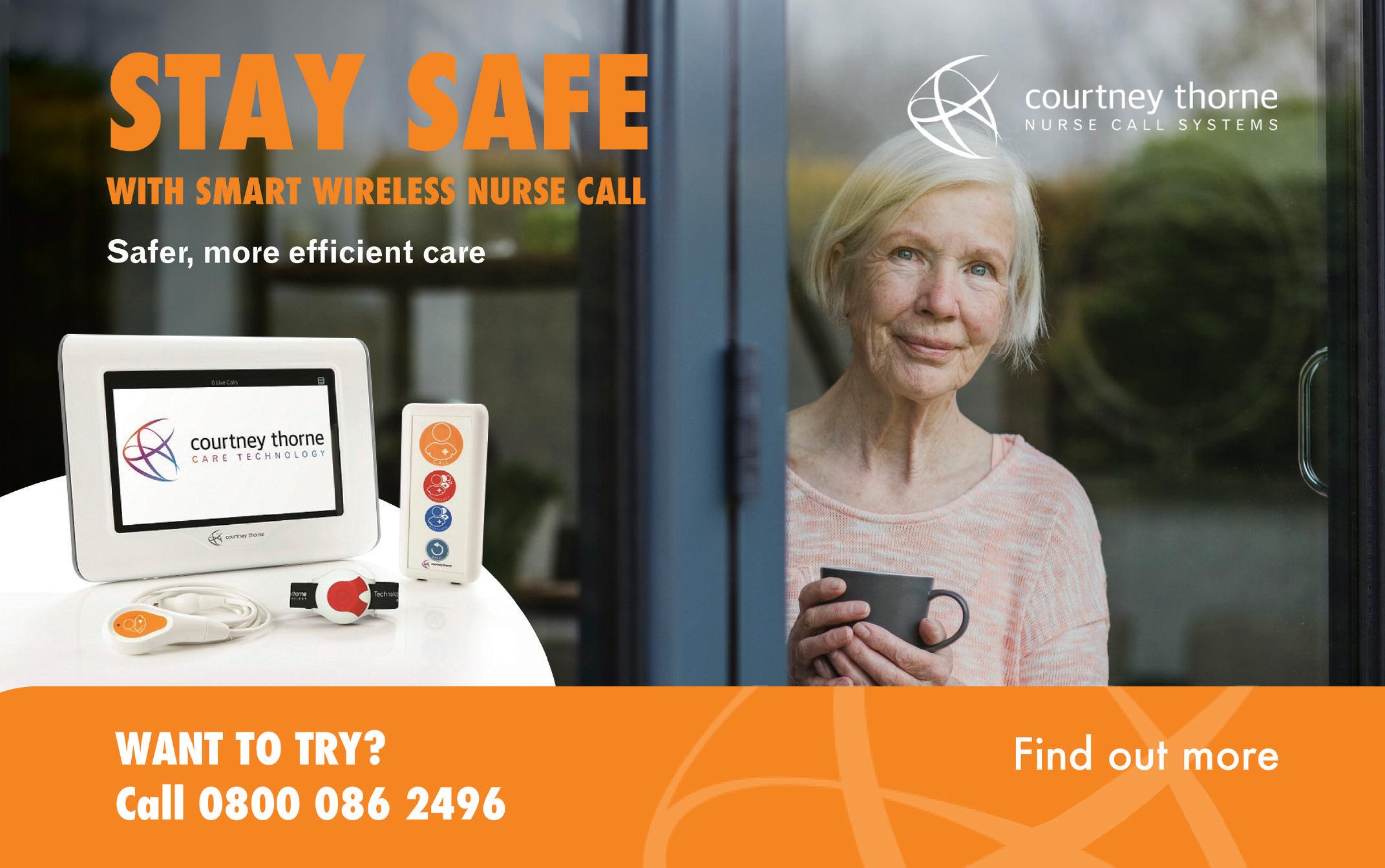
Explore the Char ted Manager Degree Apprenticeship (CMDA) with Mar y Seacole at the University of Exeter
Have you ever wondered about advancing your career, but unsure how to gain the qualifications required whist working? There is an ever-increasing demand for skilled managers within the care sector, and having practical experience is just not enough to fill those positions
Gaining a BSc (Hons) in Responsible Business Manager and




Work can and should always be a force for good But one in four workers (25%) in the north of England have experienced conflict at work over the past year, with most choosing not to report incidents such as verbal abuse and harassment according to the 2024 CIPD Good Work Index: North of England report
The research – from the annual survey of close to 900 workers across Yorkshire and Humber the North East and North West - also reveals that victims of workplace conflict suffer more from poor mental health and a lack of trust and confidence in management
As a trusted advisor to the government, the CIPD - the professional body for HR and people development - is calling for employers to ensure line managers are trained and prepared to deal with conflict effectively This starts with addressing the underlying causes such as poor management practices and excessive workloads
WHAT CONSTITUTES AS BULLYING, DISCRIMINATION, AND HARASSMENT?
The world of work is changing at pace and line managers are facing many new people challenges For some employees, homeworking and the rise of technology threatens to create an ‘always-on’ culture where issues can be spread far and wide, across online chat platforms Therefore it’s never been more important for line managers to play a vital role in identifying challenging and dealing with conflict at work
including unfair treatment and sexual harassment
To achieve this they need to participate in regular people management training This should offer specifics around what bullying discrimination and harassment looks like and how to resolve conflict by being able to have difficult yet open and honest conversations to prevent and tackle conflict at work
Managers must also take the time to understand their organisation’s policies and procedures on bullying, discrimination, and harassment and how to report issues in a timely manner, so they are investigated swiftly
IS A MANAGER’S ‘STYLE’ CAUSING CONFLICT AND STRESS?
Managers are at the heart of people s experience of their workplace What they do and say has a significant impact on their team s motivation engagement and overall performance This explains why management style can often be the source of conflict and is the second most common cause of stress at work after unmanageable workload
People managers must reflect on their own management style and the impact their behaviour has on others They should become part of the solution to resolving workplace conflict at an early informal stage before incidents escalate
To do this people managers must be open collaborative and compassionate to create a culture where staff feel trusted and confident to speak up without fear of judgement or being ignored
AVOIDING EXCESSIVE WORKLOADS & AN ‘ALWAYS ON CULTURE’
Rising technology and remote working is giving many employees –particularly parents and carers – a better work-life balance However, the blurred lines between work and home have led to many staff working longer hours to manage increasing workloads – often out of hoursand working when they are ill
Line managers need to take effective steps to manage the main risks of excessive workloads which can cause stress and mental ill health among their workers




the successful franchisee to deliver SecuriCare training programmes in their designated territory
By Daphne Doody-Green, UK Market Director, CIPD
As part of this they must assess individual and team workloads to make sure they are reasonable set clear expectations about taking breaks and act as role models for healthy working practices This includes taking time off themselves when sick Providing staff with autonomy to control how, where and when they work is also key to empower rather than restrict them in their roles
MONITORING AND REVIEWING WORKPLACE CONFLICT
Staff attitude surveys will enable people managers and the wider organisation to collect feedback in areas like gender equality and bullying and harassment
Monitoring the gender diversity of the workforce at every level, including for recruitment and promotion will also help to highlight if there is any potential discrimination or harassment on grounds of gender
NEW LAW TO PROTECT WORKERS FROM SEXUAL HARASSMENT
From October 2024 the Worker Protection (Amendment of Equality Act 2010) Bill will strengthen existing protection for workers against sexual harassment
The new law will place a new duty on employers to take reasonable steps to prevent sexual harassment Tribunals will have the power to increase compensation by up to 25% if they find an employer has breached this duty
Therefore it is essential that people managers are proactive and systematic in how they tackle and prevent sexual harassment at work by providing evidence of the reasonable steps taken This includes undertaking regular training and development to understand their role in preventing and addressing sexual harassment
FREE RESOURCES FOR LINE MANAGERS
The CIPD offer a range of free resources for people managers to develop their management capabilities and prevent and tackle workplace conflict including bullying and harassment



But
By Daniel O ’Shaughnessy, Programme Manager - Better Security, Better Care, Digital Care Hub

Check
Strengthen
continuity plan: Ensure it covers how you will manage if you were to lose access to data for a period of time Watch out for our new cyber incident response checklist – coming in October for Cyber Security Awareness Month
Create back-ups Identify what data is essential to running your service, and create a backup separate from


Founded

quality

Mike Whitehead CEO of Danforth Care commented: “Since day one our mission has always been to create a home-like atmosphere for our residents that is safe, secure, and encourages independence We are committed to providing the highest quality of care and services to our elderly residents and we strive to create a place where they can be comfortable while feeling respected and valued The support from Warwick and the financial backing they received from OakNorth will help accelerate our growth highlighted by our expectation to open seven further homes in the coming months ”
Deepesh Thakrar, Senior Director of Debt Finance at OakNorth added: “We were delighted to support Warwick on this project as it emphasises our strong ambitions to do more to
seen them

Email:
